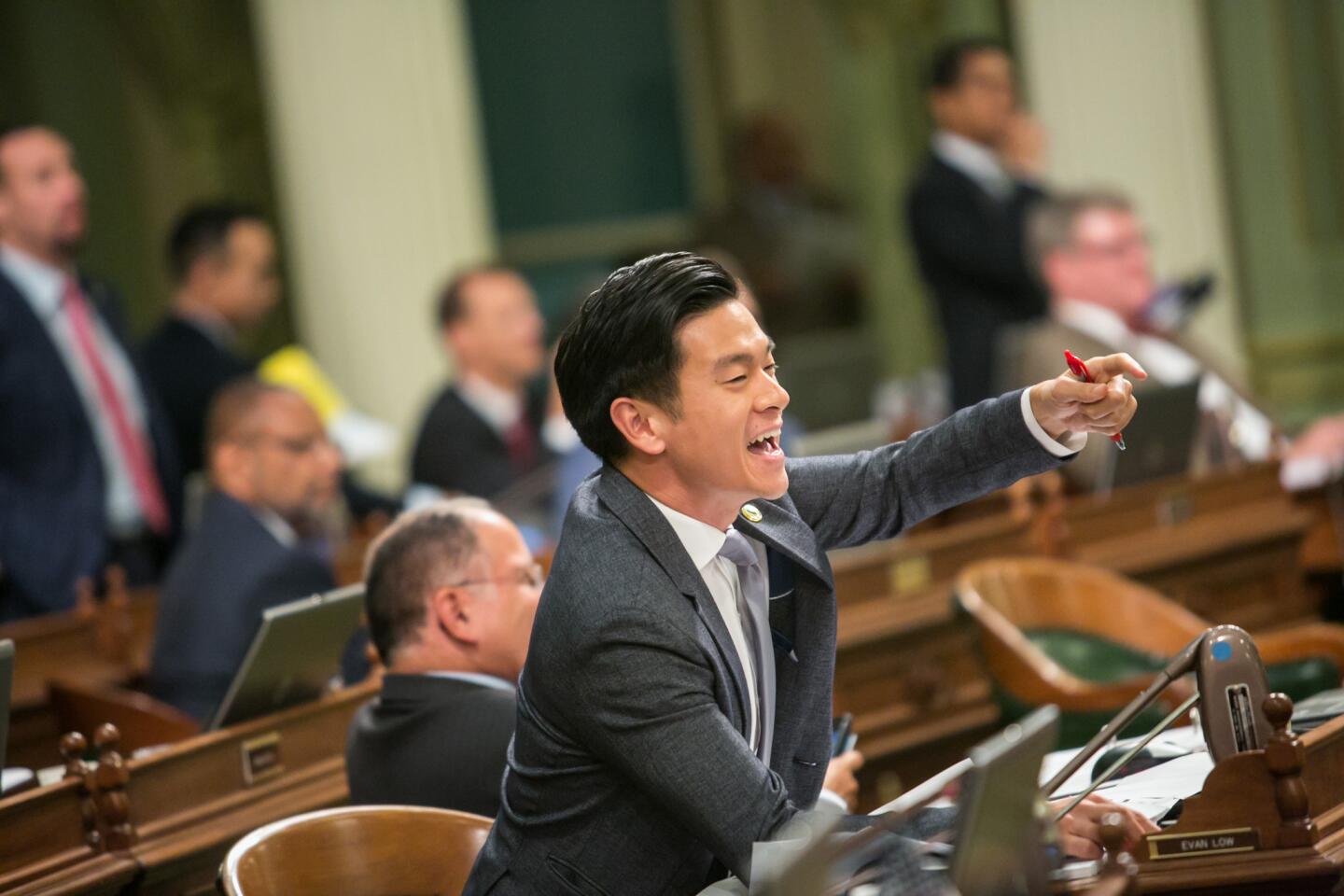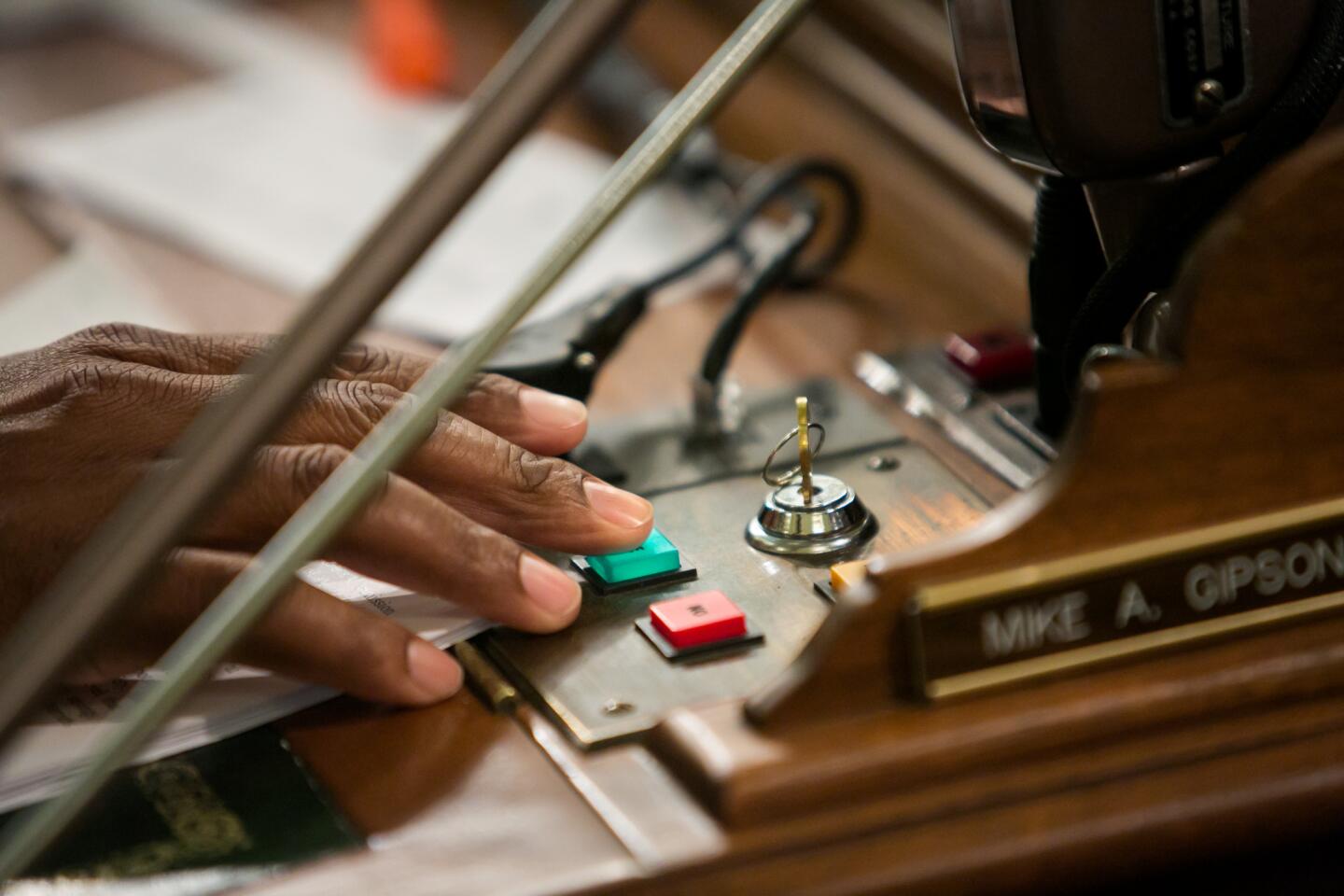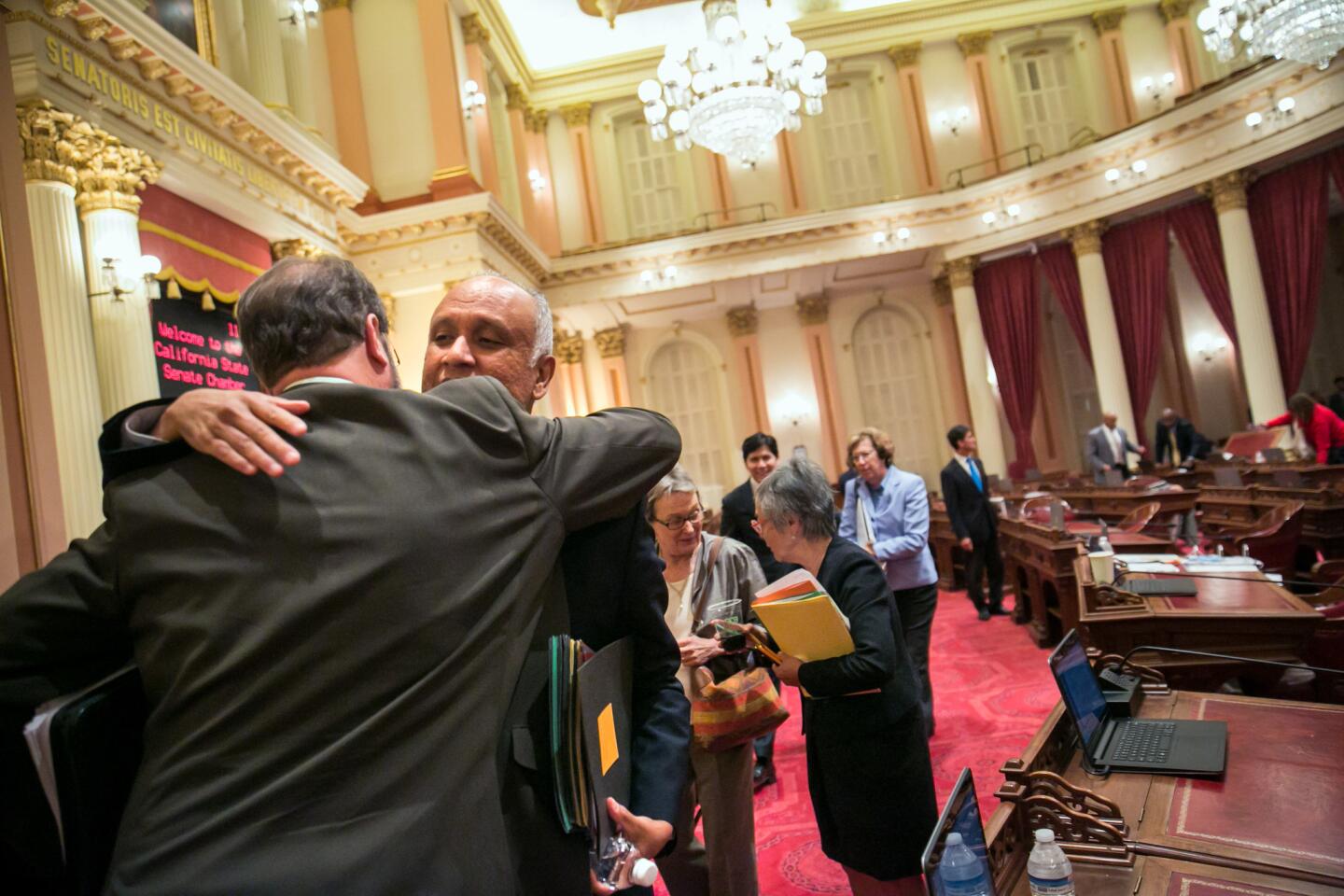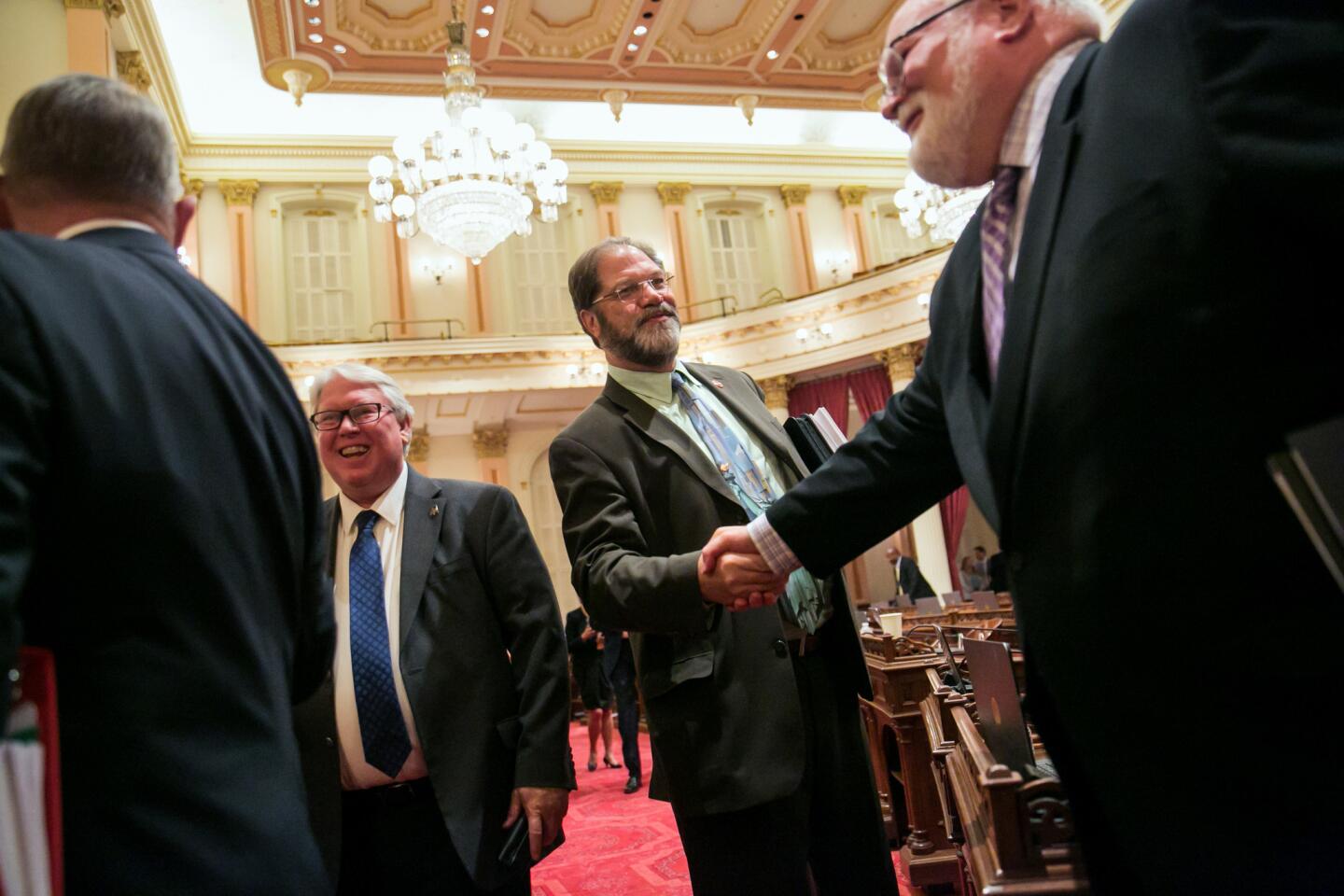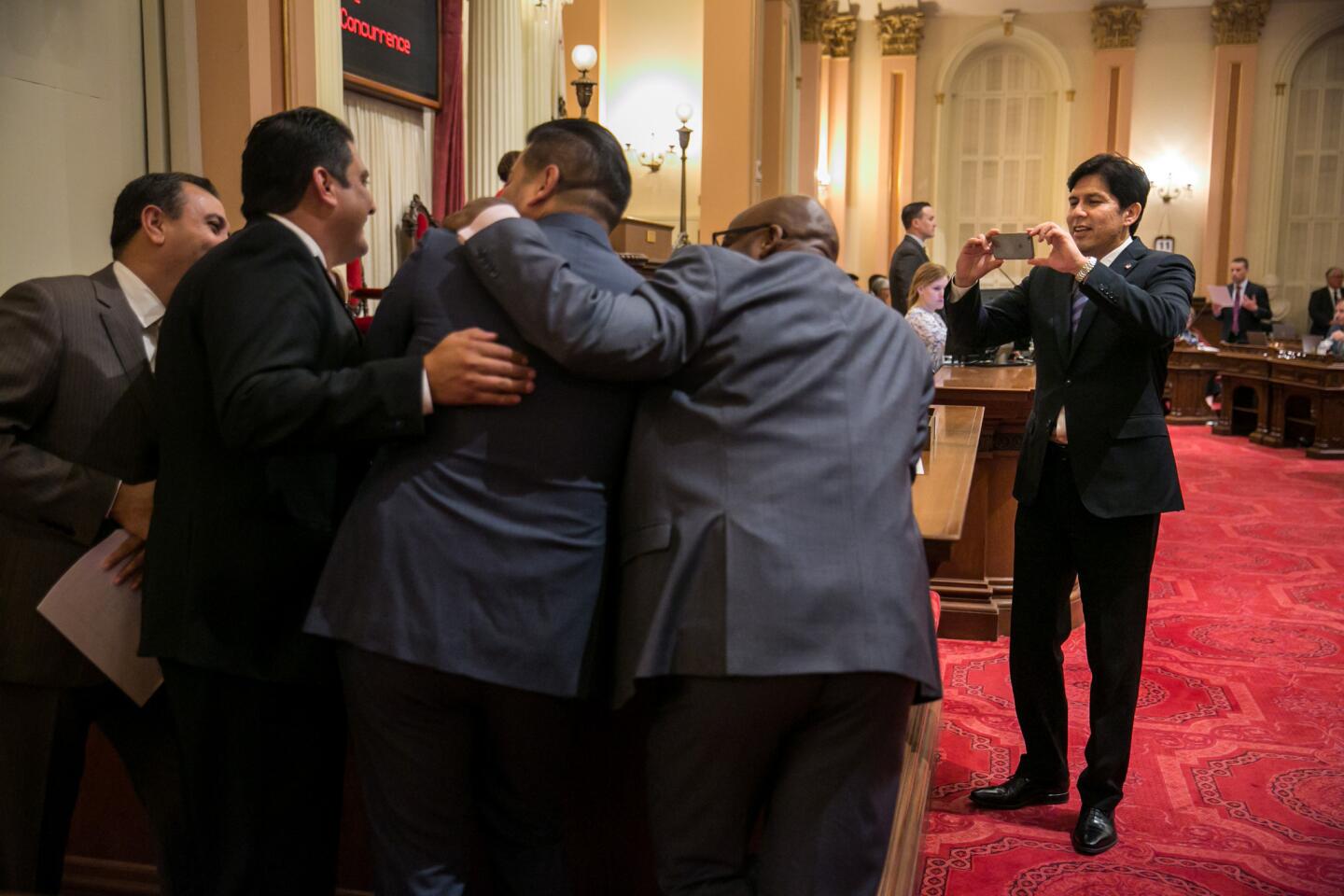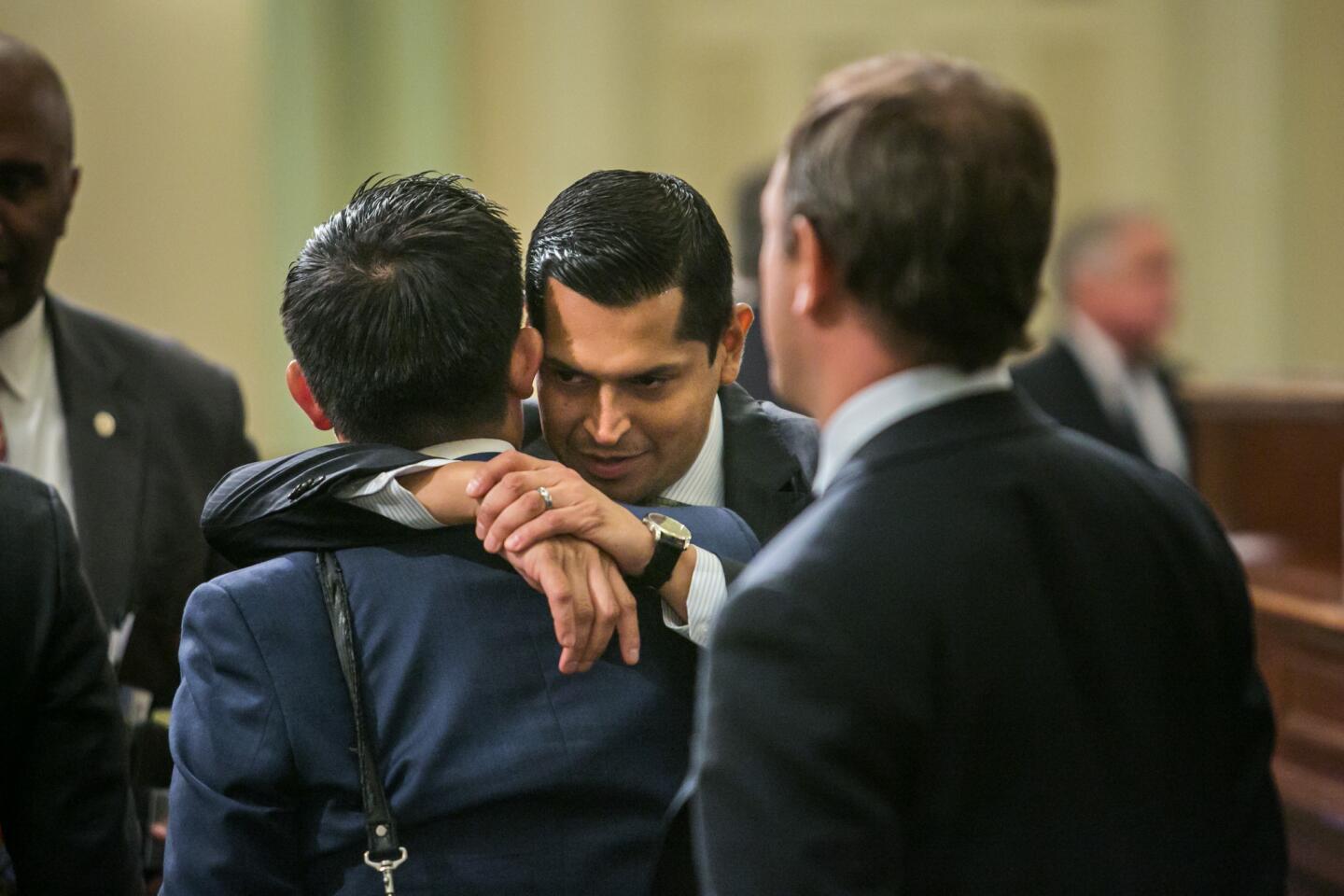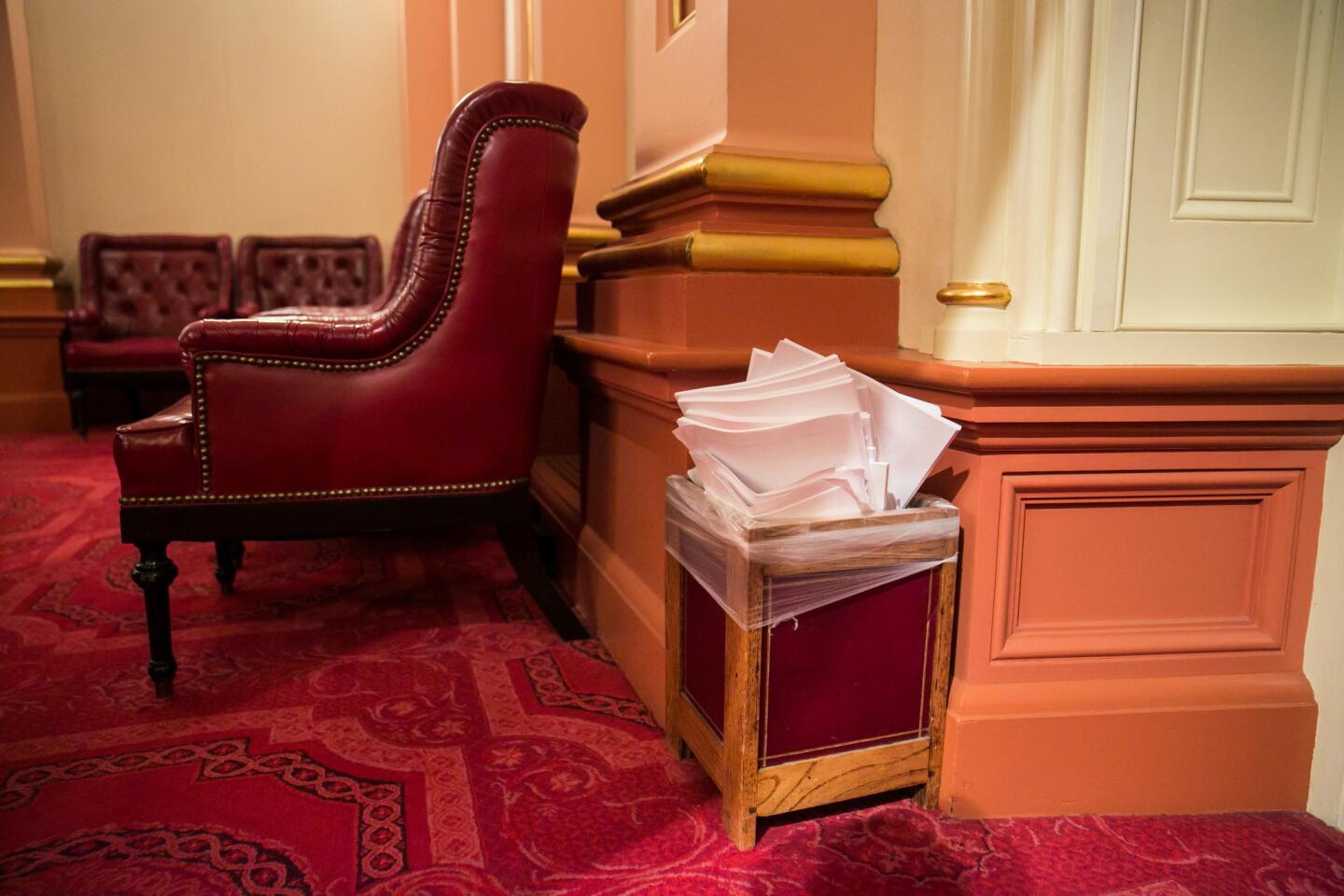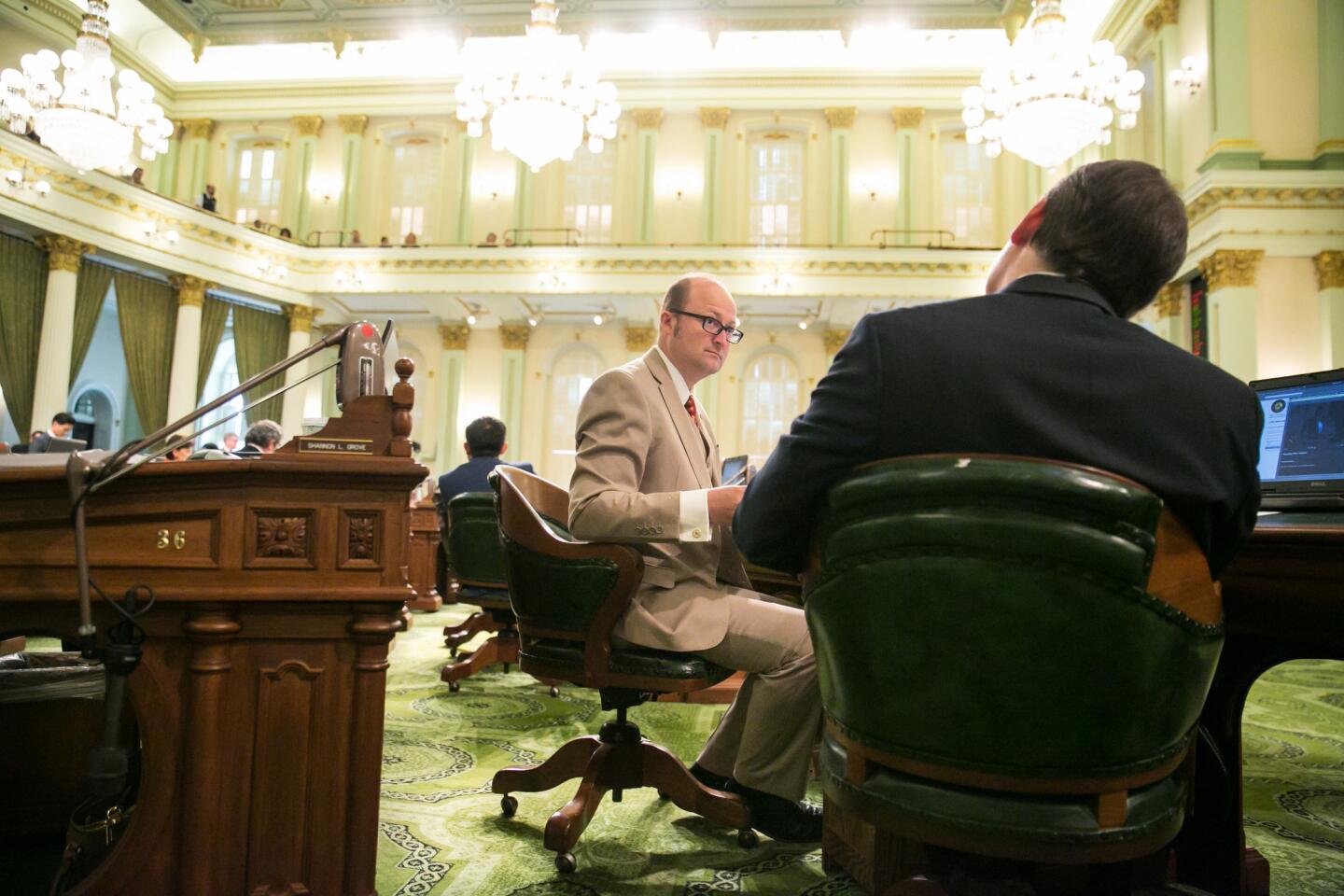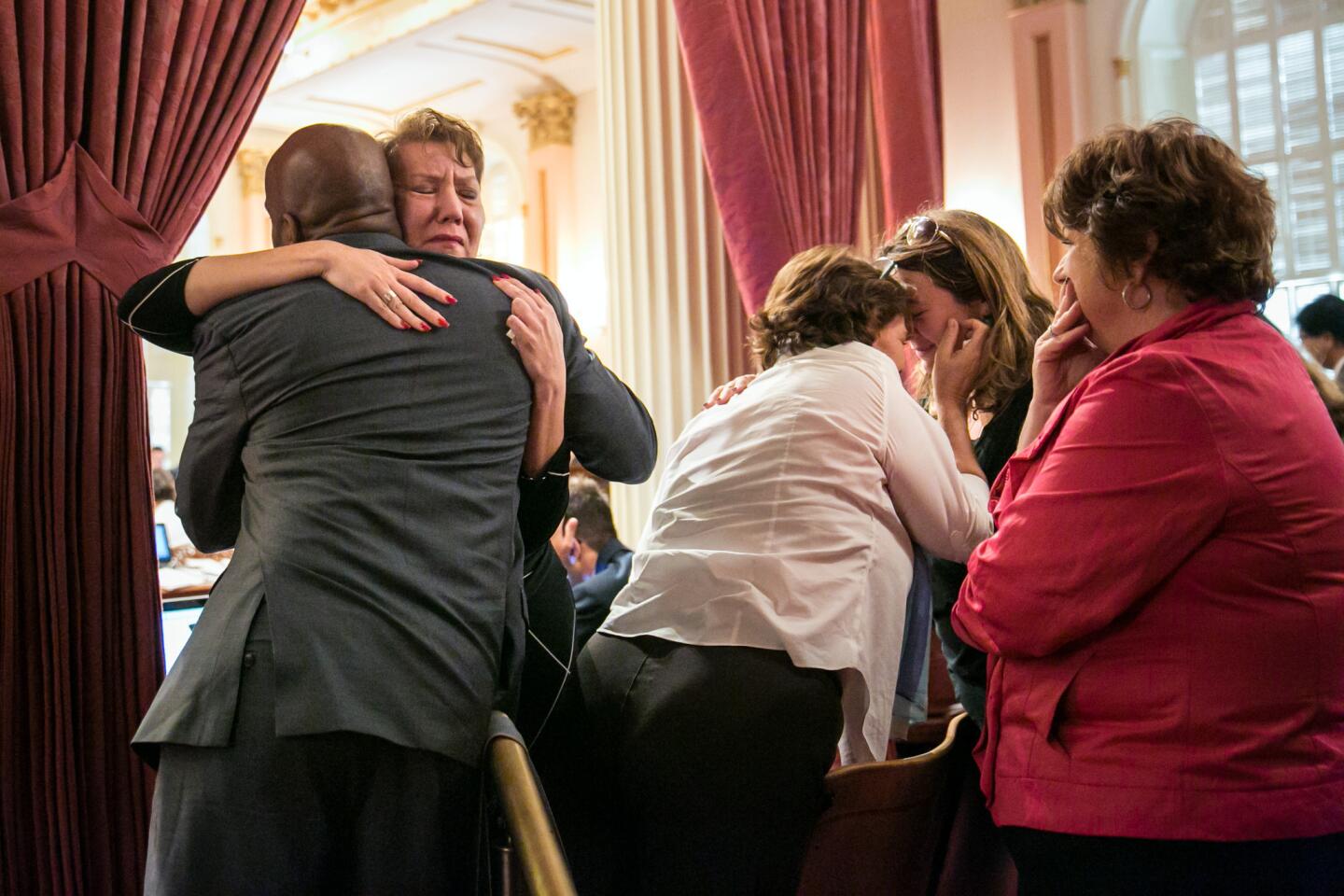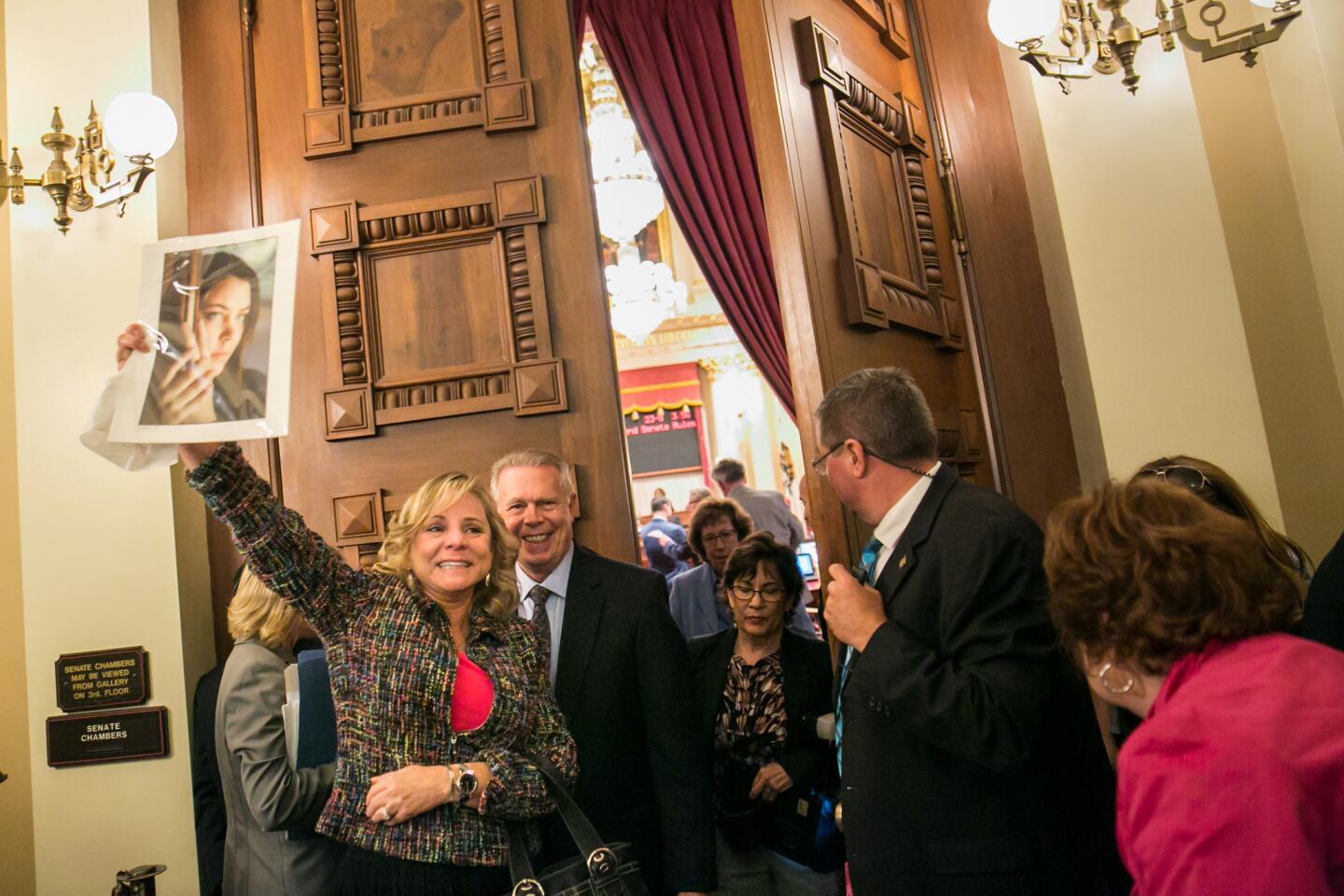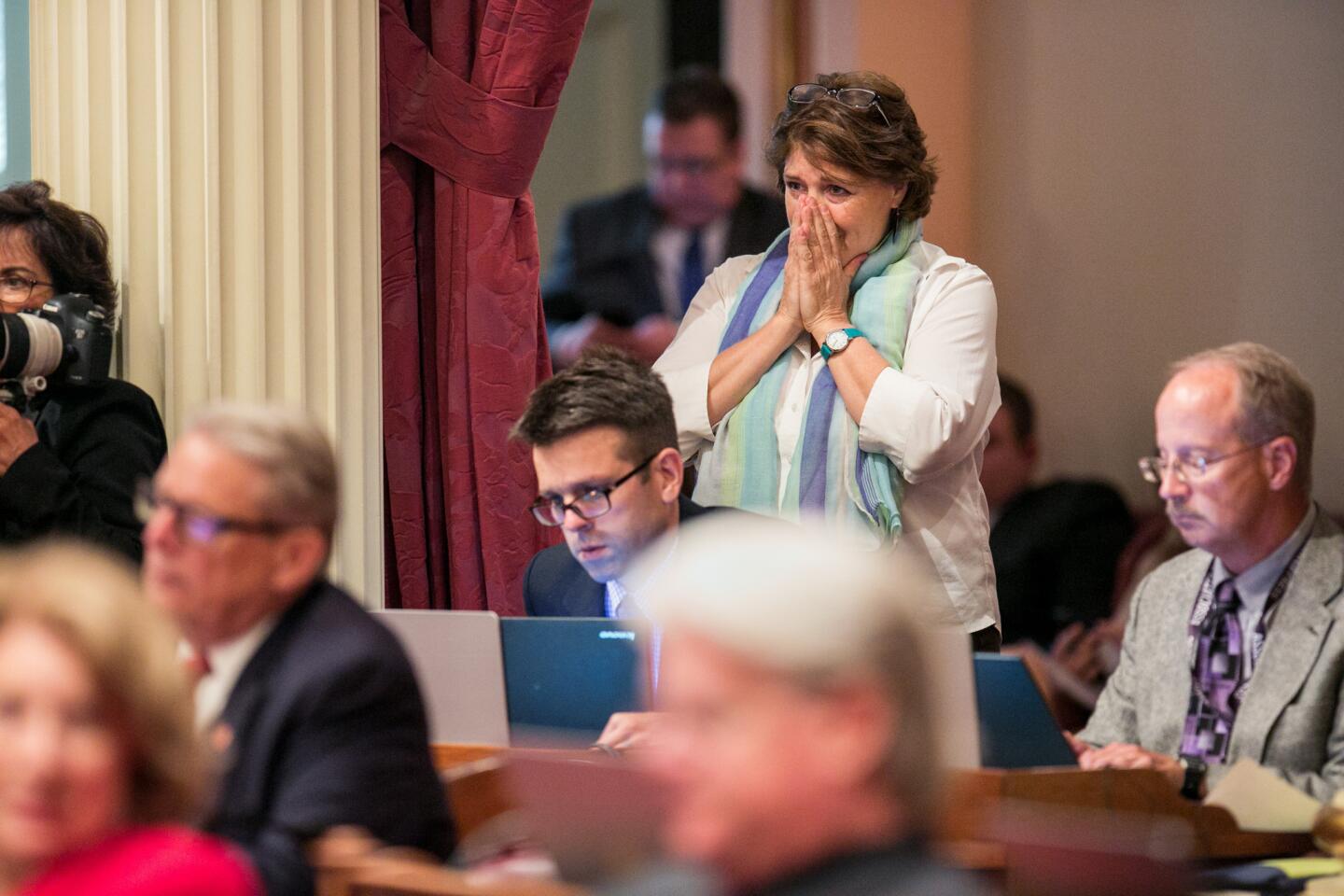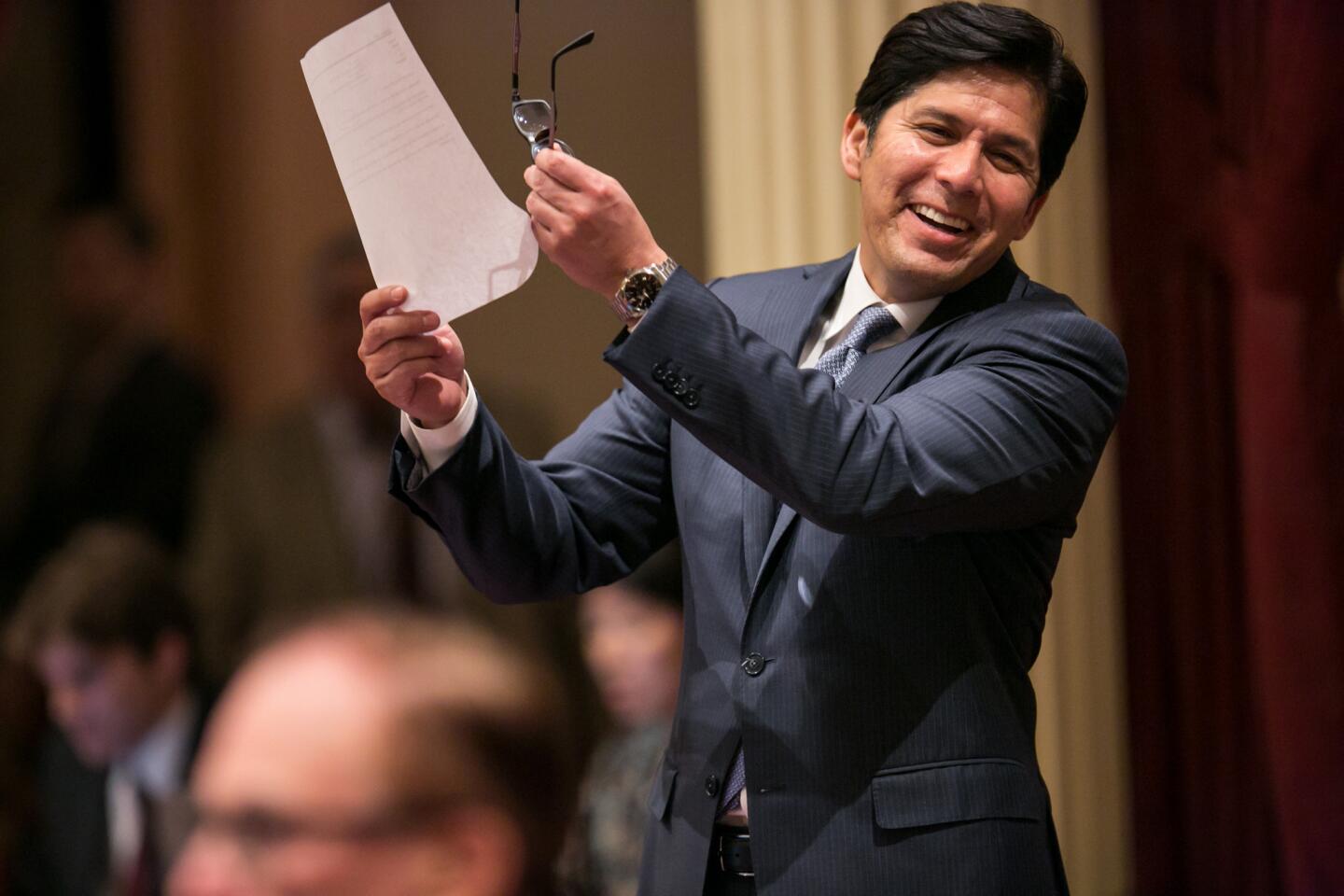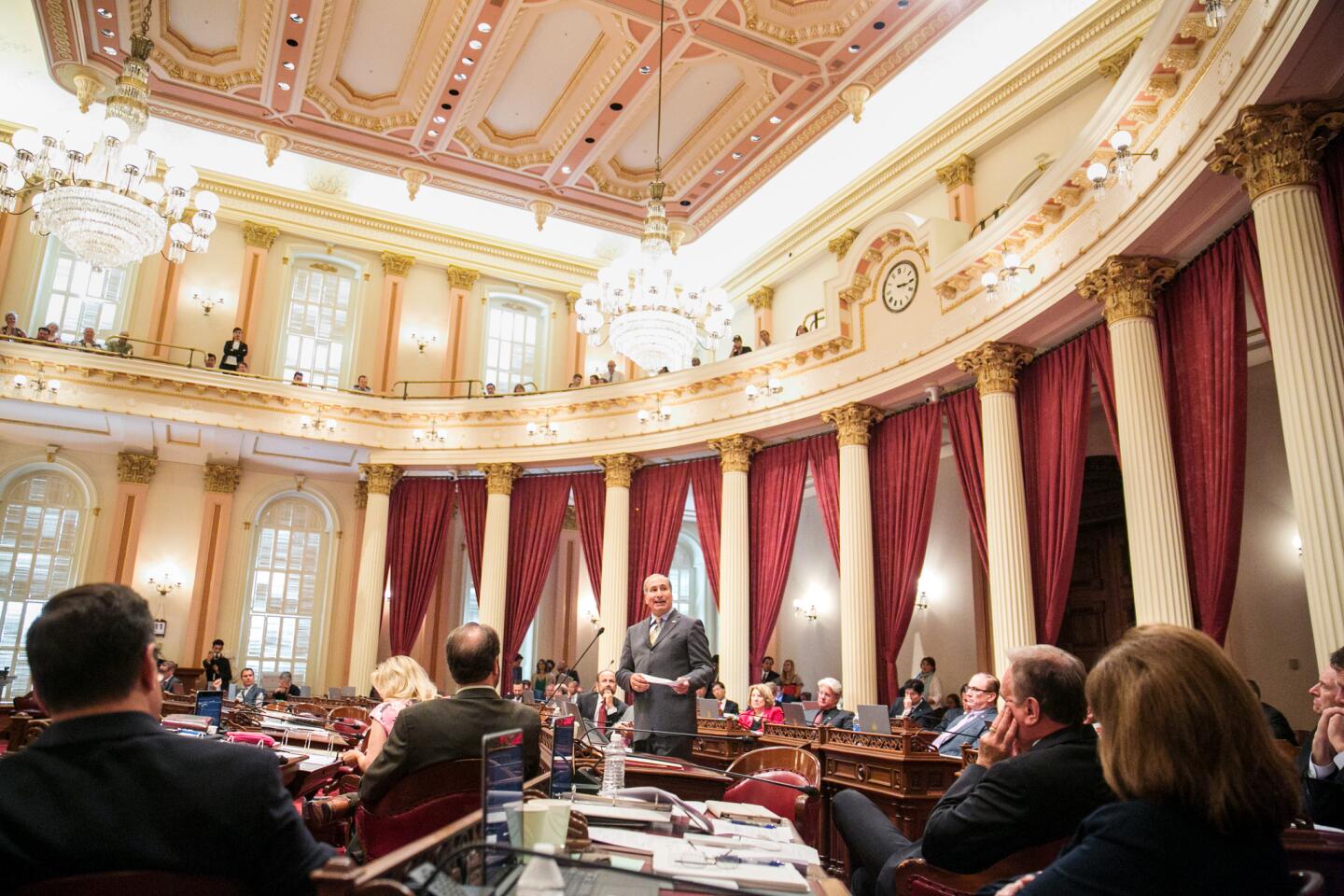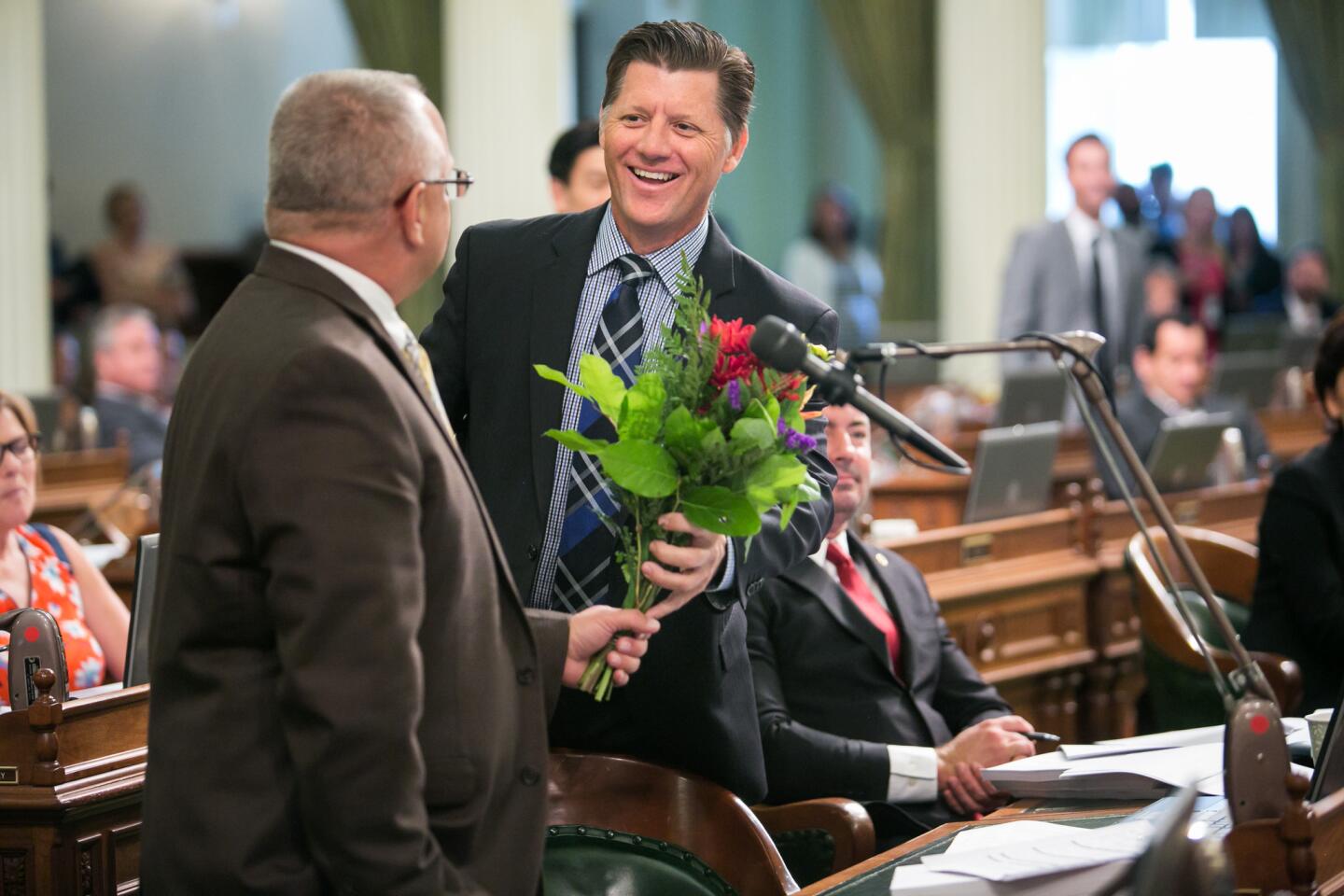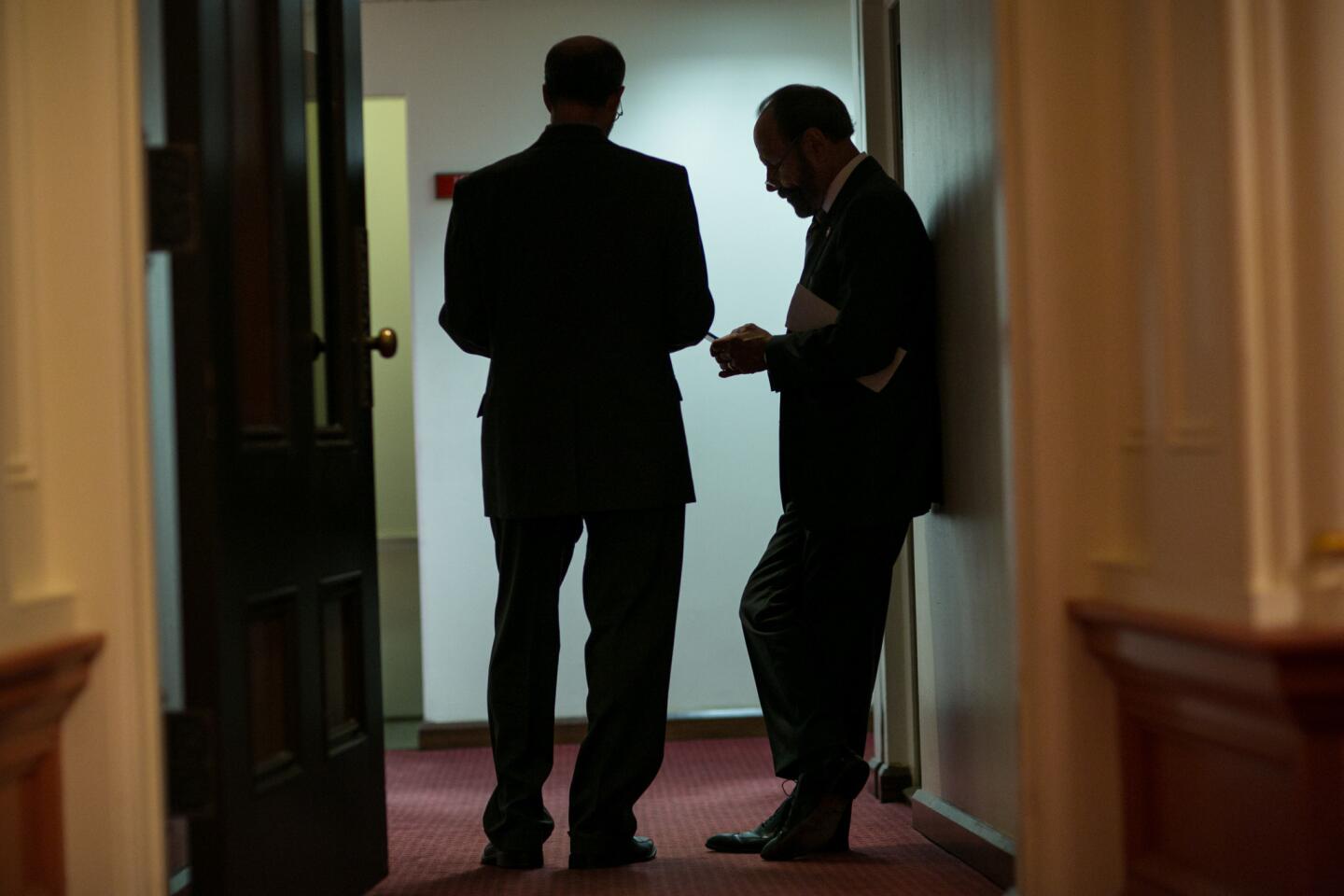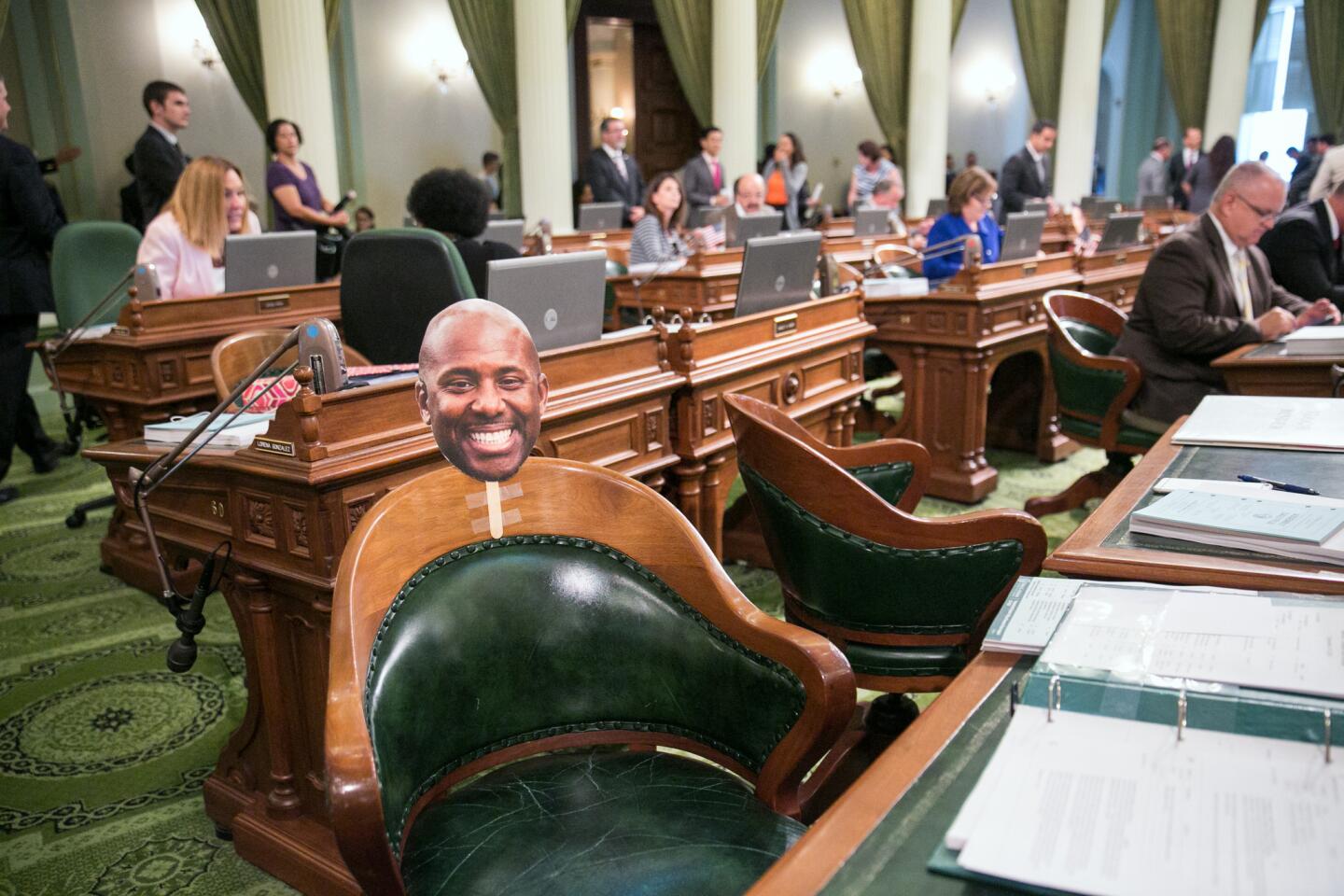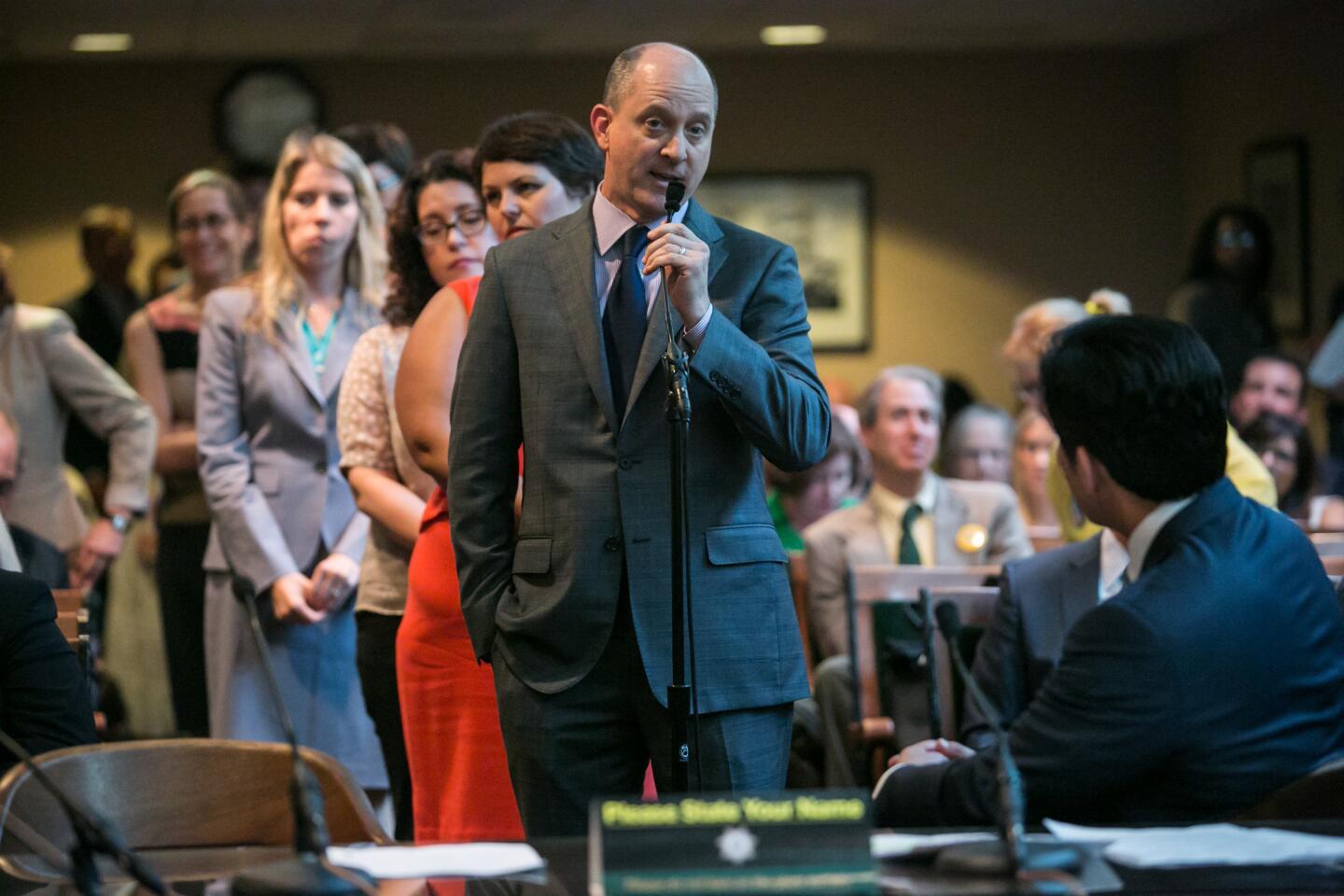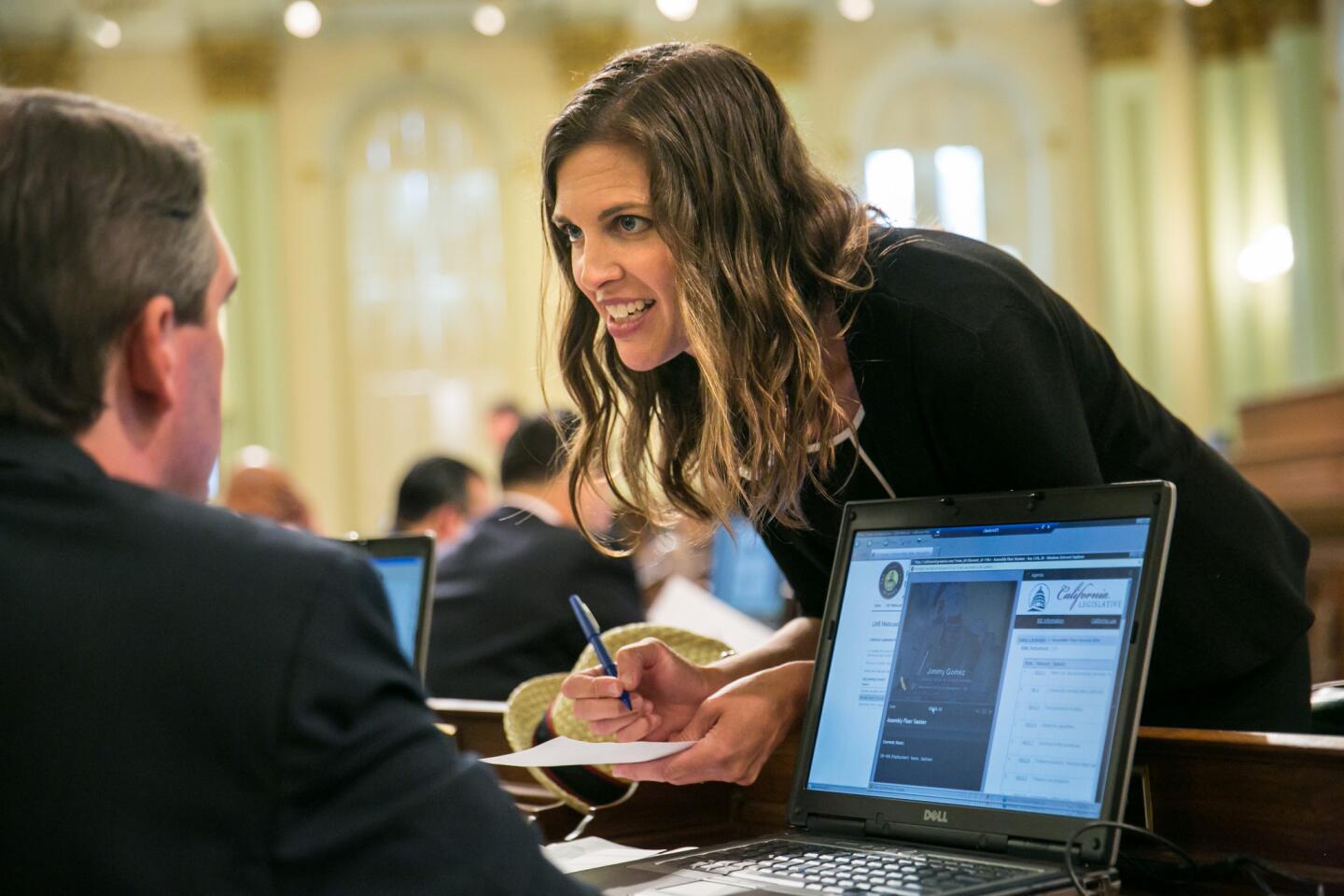Drones, medical marijuana, climate change: How California’s Legislature raced to the finish
- Share via
Lawmakers scrambled to pass dozens of bills before midnight Saturday, which marked the end of the regular legislative session in California.
Among the topics tackled during the past week were physician-assisted suicide, regulations for medical marijuana, and climate change.
Here's the play-by-play of what went down in the Capitol this week from The Times' Sacramento team.
That's a wrap! (For now)
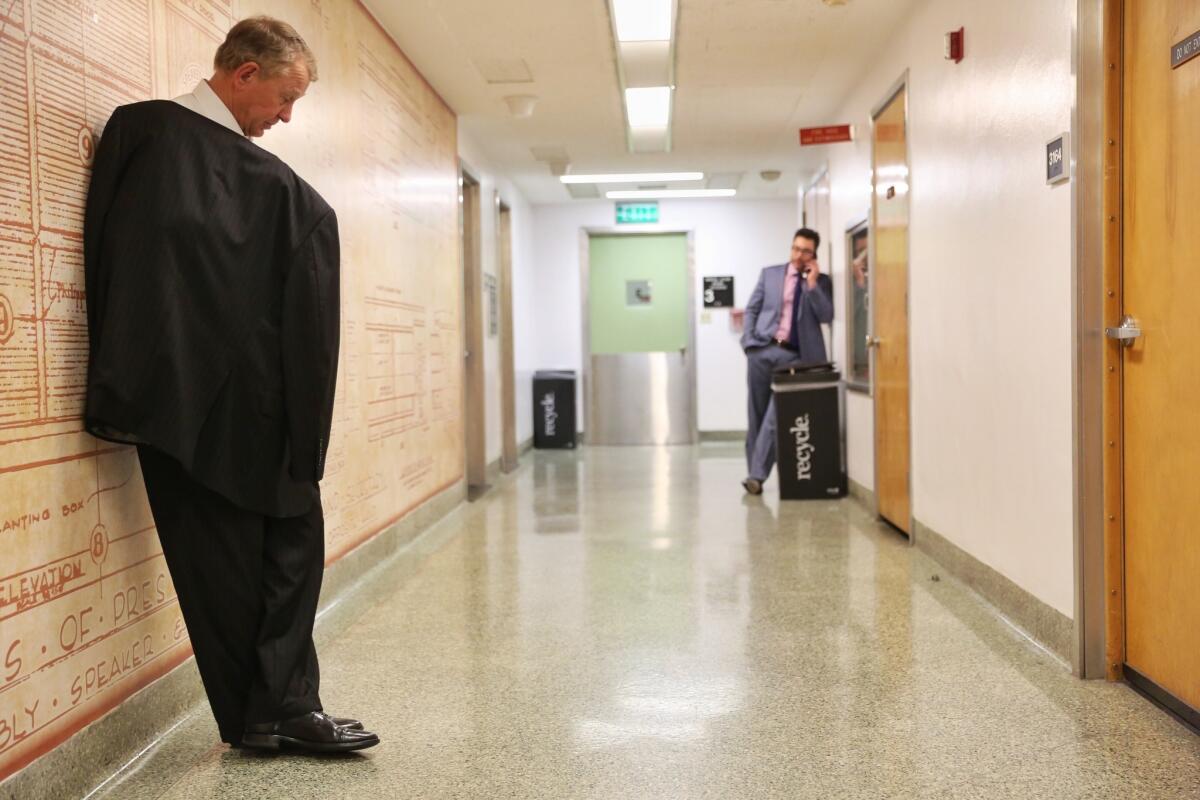
Legislators during the end of the 2015 regular session in Sacramento, Calif.
The 2015 regular session of California's legislative session has ended.
The legislature will reconvene Jan. 4. In the meantime, special sessions on healthcare and transportation remain open and lawmakers could be called back to Sacramento to work on them at any time.
Thanks for sticking with us for our end-of-session updates. For the latest on California politics and policy, check out PolitiCal and latimes.com .
Assembly is adjourned
"This house is adjourned" as of 12:22 a.m.
Passed: Bill on make-up of Air Resources Board
The measure is aimed at giving greater sway to lawmakers who represent low-income and minority communities on the state's top regulatory agency handling pollution.
The idea is that poor communities are most likely to be impacted by pollution as well as economic impacts due to tighter regulation.
This measure now heads to the governor's desk for a signature.
Senate is adjourned
The Senate gaveled out at just around 11:45 p.m. Friday, with only minutes left in the legislature's regular session.
The Assembly is still in session, and in recess as Democrats in the chamber are caucusing.
Passed: Drone restrictions bill

A fire helicopter scoops up water from Jenks Lake as it works to control flames in the Big Bear area.
The state Senate on Friday sent the governor a bill aimed at keeping aerial drones from interfering with firefighters and emergency crews.
The bill by Sen. Ted Gaines (R-Rocklin) would protect officials from liability if they use jamming devices to knock drones out of the air. It was approved by a unanimous vote.
The bill, Gaines said, “Will help keep rogue drones from interfering in these emergency situations. Most importantly, I hope it will prevent the loss of life.”
Medical pot measures move full steam ahead to governor's desk
Both legislative houses have approved a comprehensive plan to license and regulate the growth, shipping and sale of medical marijuana in California, nearly two decades after state voters legalized it.
Activists have been circulating petitions in recent weeks to qualify a ballot measure for next year that would legalize recreational use of marijuana.
The three bills approved late Friday night by both the Senate and Assembly would create a new Bureau of Medical Marijuana Regulation (BMMR) which would oversee the licensing and regulatory effort.
“This is better than what we have, the status quo, which is the Wild West,” Sen. Mike McGuire (D-San Rafael), one of the architects of the deal.
The bills now head to Gov. Jerry Brown's desk.
Passed: Climate change bill, SB 350
After clearing a major hurdle in the Assembly earlier in the day, a high-profile bill to counter climate change has passed the Senate and now awaits Gov. Jerry Brown's signature.
“We are the verge of accomplishing something truly historic,” Senate leader Kevin De Leon (D-Los Angeles) said during a lengthy speech before the Senate voted 26-14 to give final approval to his bill, SB 350.
He said the bill is full of “bold ideas.” The measure would require the state to get 50% of its electricity of renewable sources and double the energy efficiency in buildings by 2030. A controversial provision of the bill to slash gasoline use by 50% was dropped earlier in the week.
“We can move forward, set the path and show the world how it's done,” De Leon said in conclusion.
Gov. Jerry Brown sent out a statement in support after the measure passed.
“Taking carbon out of the modern economy requires heroic efforts and tireless struggle. SB 350, in both efficiency and renewable energy, ratchets up the California commitment,” Brown said. “We have the technological means and now we have the legal mandate to reduce carbon pollution."
Still awake? One hour til midnight
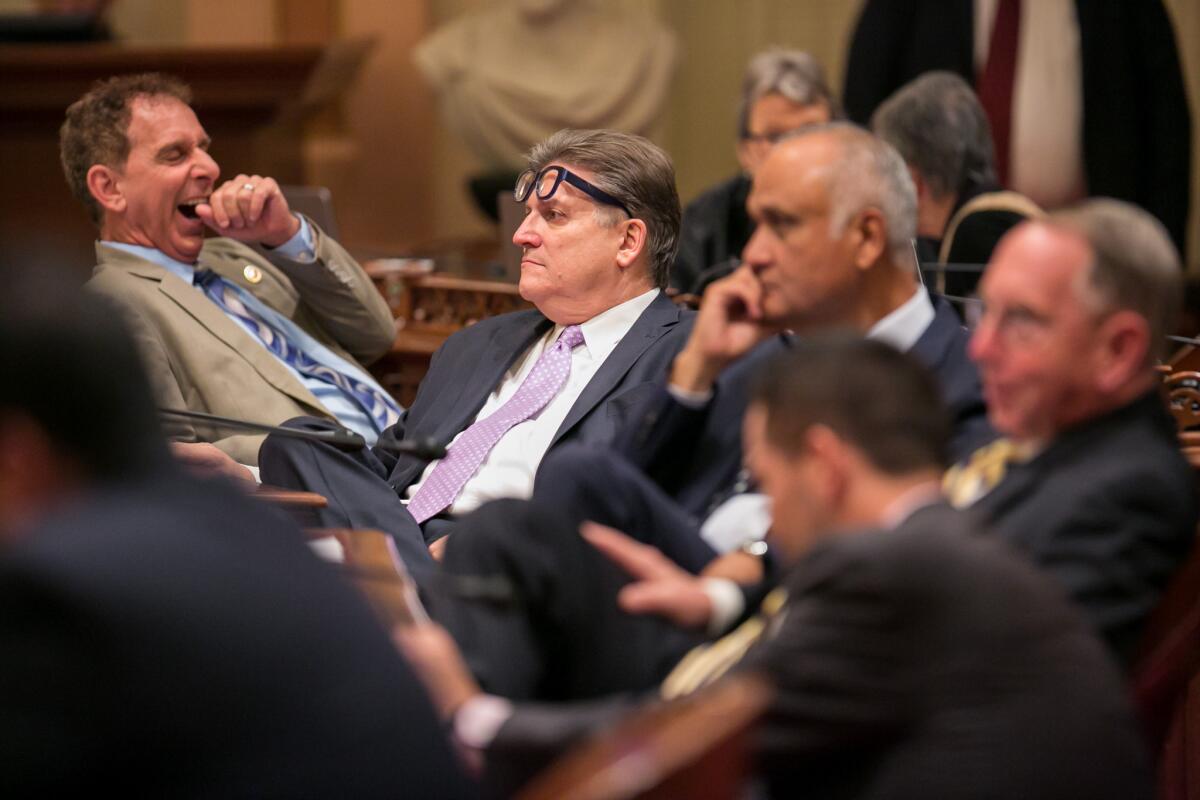
California lawmakers work into the night as they race to vote on legislation at the Capitol building in Sacramento.
See more photographs from the end-of-session madness by Los Angeles Times photographer Marcus Yam .
The blockbuster has the floor
SB 350, the climate change bill that has been through the ringer this week, is finally on the Senate floor.
This is its last stop before heading to Gov. Jerry Brown's desk.
Stay tuned for the vote, coming up shortly.
Calories don't count during end-of-session, right?
It can be tough to eat healthfully (or at all) during the chaos of the Legislature's last days of regular session this year.
Here's a sampling of the end-of-session diet this week:
Shielding against the chill
It's apparently very cold in the California state Senate tonight. At least a couple of legislators have been seen huddling with blankets, marked with the Senate seal, as the AC is reportedly on full blast.
So, where can we get one of these stylish throws?
Bill on drones interfering with firefighters flies through Assembly
SB 168, a measure that would allow firefighters to destroy drones that impede their efforts to battle fires, has passed the Assembly floor.
The bill, authored by Sen. Ted Gaines (R-Rocklin) and Assemblyman Mike Gatto (D-Glendale), would create penalties for drone operators who get in the way of firefighters.
The measure was inspired in part by a massive fire that swept through the Cajon Pass in July, jumping Interstate 15 and catching several vehicles on fire as motorists fled for their lives.
Firefighters were forced to halt water drops as they battled the blaze because a recreational drone had been seen flying nearby.
People are talking faster now
It's that time of night when bills are flying by on the Assembly floor. With less than three hours left to push bills through both chambers, lawmakers are markedly hurried.
"This bill is so good it needs no discussion," said Assemblywoman Susan Eggman (D-Stockton), shortly before a vote was called on her bill on alternative energy.
On another bill, Assemblyman Mike Gatto (D-Los Angeles) declined to give a closing speech, except to ask that the bill, if passed, be immediately transmitted to the Senate. It was.
Legislative bingo: Pokemon, Taylor Swift, Daisy Dukes
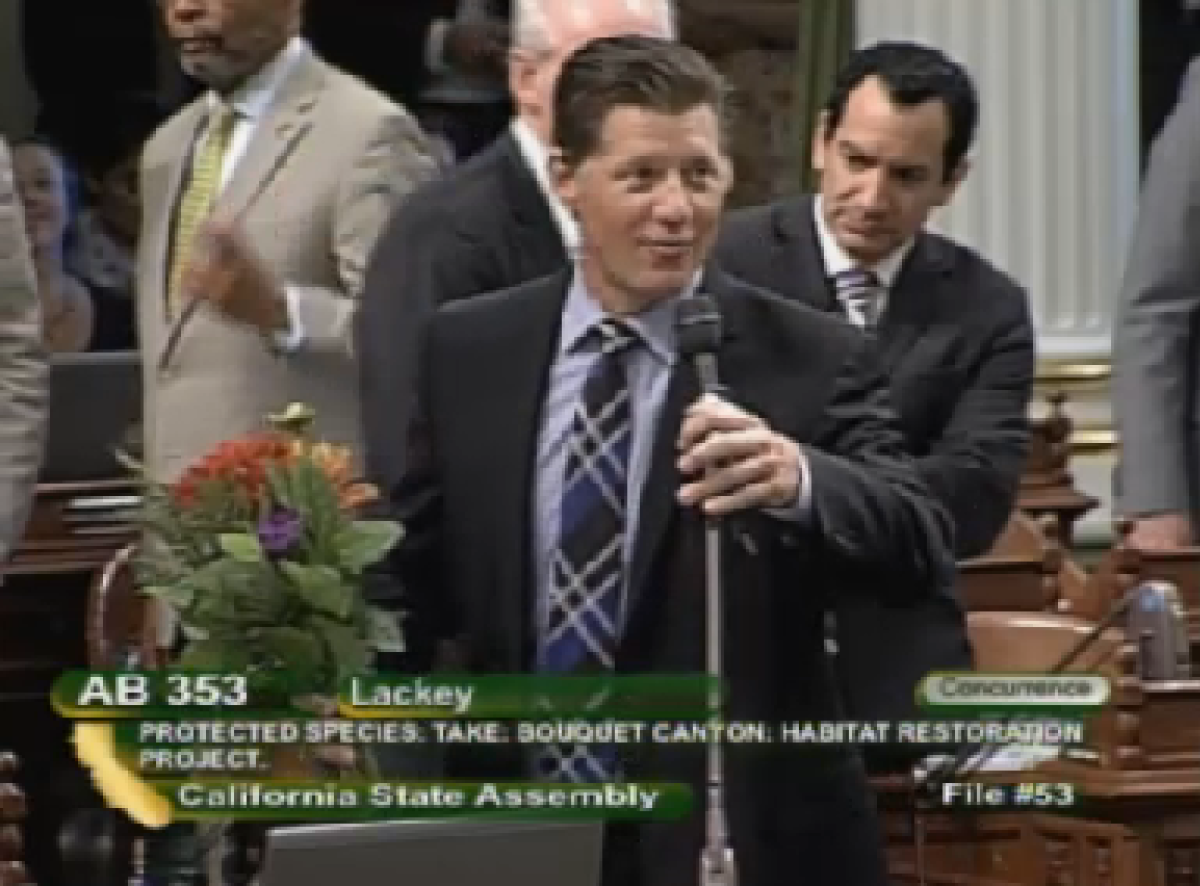
In this still image from a California Channel broadcast, Assemblyman Brian Jones (R-Santee) holds a bouquet of flowers he promptly delivered to fellow lawmaker, Tom Lackey (R-Palmdale) on the Assembly floor during debate Thursday.
Legislative bingo has become a favorite end-of-session tradition in Sacramento. The exercise involves legislators inserting strange phrases into their floor speeches, much to the amusement of their colleagues and reporters.
We haven't seen an official, unofficial legislative bingo card yet, but here are the likeliest suspects:
In a discussion Friday evening about AB 232, a bill on hospital seismic safety, one lawmaker dropped Taylor Swift's famous line, "Shake, shake it off."
Other phrases heard throughout the last week of session included "Shut up and dance with me," "Mr. T.," and "Boom goes the dynamite."
During an Assembly floor debate Thursday on a measure about the protected status of the unarmored threespine stickleback fish, lawmakers managed to squeeze in the following phrases: "pizza," "Pokemon," "Pikachu," "Who's your Daddy?" and "Daisy Dukes" while (mostly) keeping straight faces.
The Sacramento Bee compiled the mentions in this video.
But not everyone is amused by this legislative pasttime.
SB 350: How the vote went down
Here's how your Assembly members voted on the climate change bill:
The measure must pass the Senate tonight before it can go to the governor, but the Assembly was seen as the key hurdle.
Climate change rules clear Assembly, minus gas-use slash
A high-profile bill to combat climate change just cleared a major hurdle on the Assembly floor by a vote of 51-26. Applause and cheers could be heard in the chamber after its passage.
The bill by Senate Leader Kevin de León (D-Los Angeles) would require the state to get 50% of its electricity from renewable sources, such as solar and wind, by 2030. It also would double the energy efficiency in buildings in the next 15 years.
But the most controversial part of the measure — a requirement to cut petroleum use in California by 50% — was dropped earlier this week in the face of stiff opposition from the oil industry and resistance from a sizable number of Assembly Democrats, who said they were concerned about economic impacts and an expansion of executive power.
SB 350 now heads to the Senate for final approval.
Battle on for hearts and minds on climate change bill
For many legislators over the last few weeks, SB 350 has boiled down to what is best for California's poor.
In an unusual departure, one Republican lawmaker said he would vote for the measure.
Stay tuned for the Assembly floor, coming in minutes.
Happening now: climate change bill in Assembly
SB 350 -- climate change legislation that was amended this week to drop a provision to reduce oil use by 50% by 2030, much to Gov. Jerry Brown's and Senate leader Kevin de León's consternation -- is still pending a vote on the Assembly floor and then needs final Senate approval.
Passed: Medical marijuana regulations

The state Senate on Friday approved a plan to license and regulate the growth, shipping and sale of medical marijuana in California, with lawmakers hoping it will bring order to what has been a Wild West atmosphere.
The action comes as activists have begun circulating petitions to qualify a ballot measure for next year to legalize recreational use of marijuana.
The regulations, which still must be approved by the Assembly, were worked out with Gov. Jerry Brown.
"It brings structure and regulation to the medical marijuana industry, something that has been lacking for two decades," Sen. Sharon Runner (R-Lancaster) said.
Lawmakers worked out three bills with the staff of Gov. Jerry Brown. Each will take on a portion of the regulatory plan.
Bills approved by the Senate would create a new Bureau of Medical Marijuana Regulation (BMMR) within the Department of Consumer Affairs that would oversee a multiagency licensing and regulatory effort.
Both the state and cities would license each dispensary and hold the power to revoke the license if regulations are violated.
Two of the three bills have passed. They now move to the Assembly for consideration later tonight, where they are expected to pass.
Passed: L.A. County transit tax bill
Los Angeles County residents may end up paying a higher sales tax some day under legislation sent by lawmakers to Gov. Jerry Brown on Friday.
The Senate sent the governor a bill that would allow the Los Angeles County Metropolitan Transportation Authority to seek approval from voters for a half-cent increase in the sales tax to continue projects aimed at reducing the region's traffic gridlock.
Senate leader Kevin de León (D-Los Angeles) introduced the measure to help the county that already has three half-cent tax increases in place, approved by voters in 1981, 1991 and 2008. The last one, Measure R, passed with 67% of the vote.
“It's about choice,” De León told his colleagues, adding that the bill will help reduce traffic congestion and pollution.
Passed: Oil-spill response measure
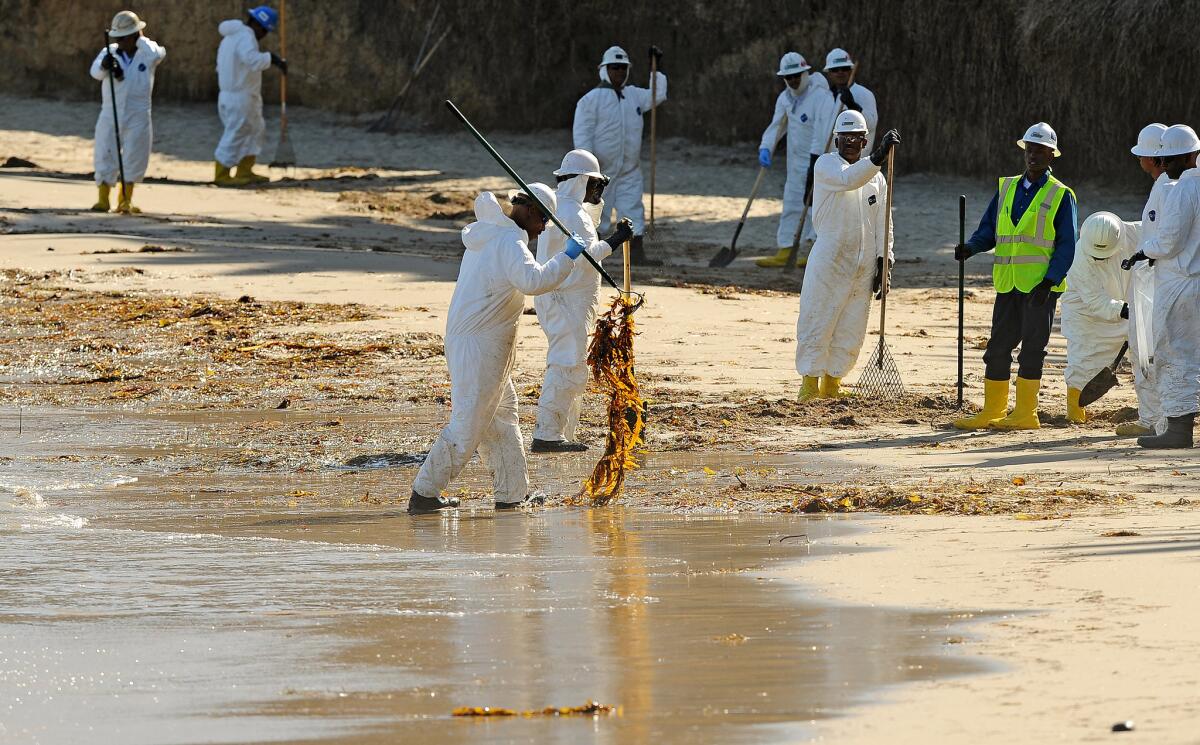
White-suited workers clean up oil from Refugio State Beach, five days after a pipeline rupture sent thousands of gallons of crude into the ocean.
The state Senate on Friday sent the governor a bill aimed at improving the response to oil spills such as the one that fouled Refugio State Beach this year. The bill, by Sen. Hannah-Beth Jackson (D-Santa Barbara,) would have the state study the potential hazard and effectiveness of using chemical dispersants.
It would also task state maritime officials with developing a plan to recruit commercial fishing boats, tugs and other vessels near a spill for a quick response to contain future spills.
Private and government resources were slow to respond to the Refugio spill, which eventually reached 100,000 gallons.
“This focuses on what we can do to prevent these things from happening in the future,” Jackson said.
Assembly takes an hour recess
The lower house is waiting for the Senate to act on Assembly bills.
Assembly members will be taking an hourlong break, returning at 7:30 p.m.
A cartoon primer on the gut-and-amend process
For those of you following along at home, AB 1288 is one of the more closely watched bills that has been substantially altered under a legislative maneuver called "gut-and-amend."
This procedure, which often makes an appearance in the eleventh hour of legislative bargaining, largely replaces a bill's original language with other, often unrelated, topics.
Here's an explainer via KQED on the process:
Bill to give legislators two seats on air quality board moves forward
A measure that would give lawmakers from low-income and minority districts two seats on the California Air Resources Board has passed out of committee.
AB 1288 had been stripped of its original language, which would have made the state's cap-and-trade program permanent. It now is aimed at giving lawmakers who represent low-income constituents more sway on the state's top regulatory agency for handling pollution.
The measure now goes on to the Senate floor.
Teary-eyed supporters of aid-in-dying bill rejoice
Brittany Maynard's mother speaks out after right to die bill passes
The family of Brittany Maynard, the California woman who moved to Oregon to legally end her own life rather than endure a painful struggle with brain cancer, has been front and center in the Legislature's debate over aid-in-dying this year.
Following the measure's passage in the Senate, her mother, Debbie Ziegler, spoke to reporters.
"She said, 'Mom, it's not fair that we have to move to do this,'" Ziegler recalled her daughter saying. "She wanted to live, she loved this world," Ziegler said.
State Senate leader Kevin De Leon (D-Los Angeles) also spoke after the bill passed. "I'm very proud that this bill received a clear-eyed, open-hearted debate at every step of the legislative process."
Passed: Right-to-die regulations for terminally ill patients
The state Senate has voted to approve and send the governor a bill that would allow physicians to prescribe life-ending drugs to Californians diagnosed as having less than six months to live.
The question now is what action Gov. Jerry Brown, a former Catholic seminarian, will take on the measure.
Brown has not yet taken a public position on the proposal.
The measure passed with a vote of 23-14 on the Senate floor, following an emotional and passionate debate.
Negotiations for tax on health plans stall
California currently imposes a tax on plans with Medi-Cal patients, but the federal government has said the state must change that to tax all managed-care organizations, or face a plunge in federal funding.
Debate over right-to-die law underway
Passed: Automatic voter registration
California lawmakers on Friday approved a bill that would automatically register to vote any eligible Californian who gets a driver's license or state identification card -- unless the person opts out.
The measure was prompted by the 42% turnout in the November election, as well as the turnout for the March election in Los Angeles, in which only about 10% of eligible voters went to the polls.
Nearly 7 million Californians, mostly young people, are eligible, but not registered, to vote. In an effort to boost the number, Assemblywoman Lorena Gonzalez (D-San Diego) introduced a bill modeled on a new law in Oregon to get more people to the polls.
The measure now heads to Gov. Jerry Brown for his consideration.
The measure would not take effect until a new computerized voter registration database is established some time next year.
And we're back
Questions about marijuana regulation deal
Meanwhile, the state Senate is still adjourned while members attend the ceremony to honor three men who have been hailed as heroes in a French train attack. The three men grew up in Sacramento.
Working the floor for family leave
Vote on right-to-die law delayed
Images from the last-day rush
Effort to expand family leave facing resistance
California state Sen. Hannah-Beth Jackson, D-Santa Barbara, has said her bill would extend protection to employees of companies with 25 to 49 workers after a previous law took effect for firms with 50 or more. The bill passed the state Senate in June with a bare majority, 21 to 16. Republicans objected that it would subject businesses to lawsuits and difficulty in staffing. The California Chamber of Commerce opposes the bill as a "job killer."
Brittany Maynard's husband 'confident' governor would sign right-to-die law
The right-to-die proposal that is before the Senate Friday morning gained momentum after Californian Brittany Maynard moved to Oregon last November so she could end her life and avoid the pain and debilitating effects of brain cancer.
Her husband, Dan Diaz, noted that three days before she died, Maynard talked to Gov. Jerry Brown about her desire for California to adopt an aid-in-dying bill like Oregon's.
“I am confident that the governor will listen to the 75% of Californians who do support this option, that the governor will take into consideration that this is an option for an individual voluntarily to pursue,” Diaz said.
Welcome to the last day
What we're watching:
A deal on medical marijuana regulations is expected to be voted on today.
A proposed $2-a-pack cigarette tax is still on the table.
Right-to-die legislation, which was approved by the Assembly on Wednesday, still needs to clear the Senate and the governor's desk.
SB 350 -- climate change legislation that was amended this week to drop a provision to reduce oil use by 50% by 2030, much to Gov. Jerry Brown's and Senate leader Kevin de Leon's consternation -- is still pending a vote on the Assembly floor and then needs final Senate approval.
Medical marijuana regulations expected today
Lawmakers who have been negotiating a plan to regulate medical marijuana in California last night said they had reached an agreement in time for the end of session today.
The regulations will be divided between a couple of bills in the Senate and the Assembly. They would create a new statewide Bureau of Medical Marijuana Regulation that will issue licenses for medical cannabis dispensaries. The bills also include a carve-out for Los Angeles so it can continue to enforce regulations approved by voters.
Details about the agreement are still emerging and we'll have more today, but one major implication is this:
Failed: Effort to expand county boards of supervisors
The Senate last night could not muster a two-thirds vote to put a constitutional amendment on the ballot that would have required large California counties, including Los Angeles, to expand their five-member boards of supervisors to at least seven members.
Sen. Tony Mendoza (D-Artesia) might bring it up again Friday, but he was able to get only 24 of the 27 votes he needed on Thursday after four Democrats voted against it and Sen. Holly Mitchell (D-Los Angeles) withheld her vote. Mendoza said his proposal would increase the opportunity for minority communities to elect representatives.
It would apply to all five counties with populations of 2 million people or more: Los Angeles, Orange, San Bernardino, Riverside and San Diego.
Automatic voter registration plan approved
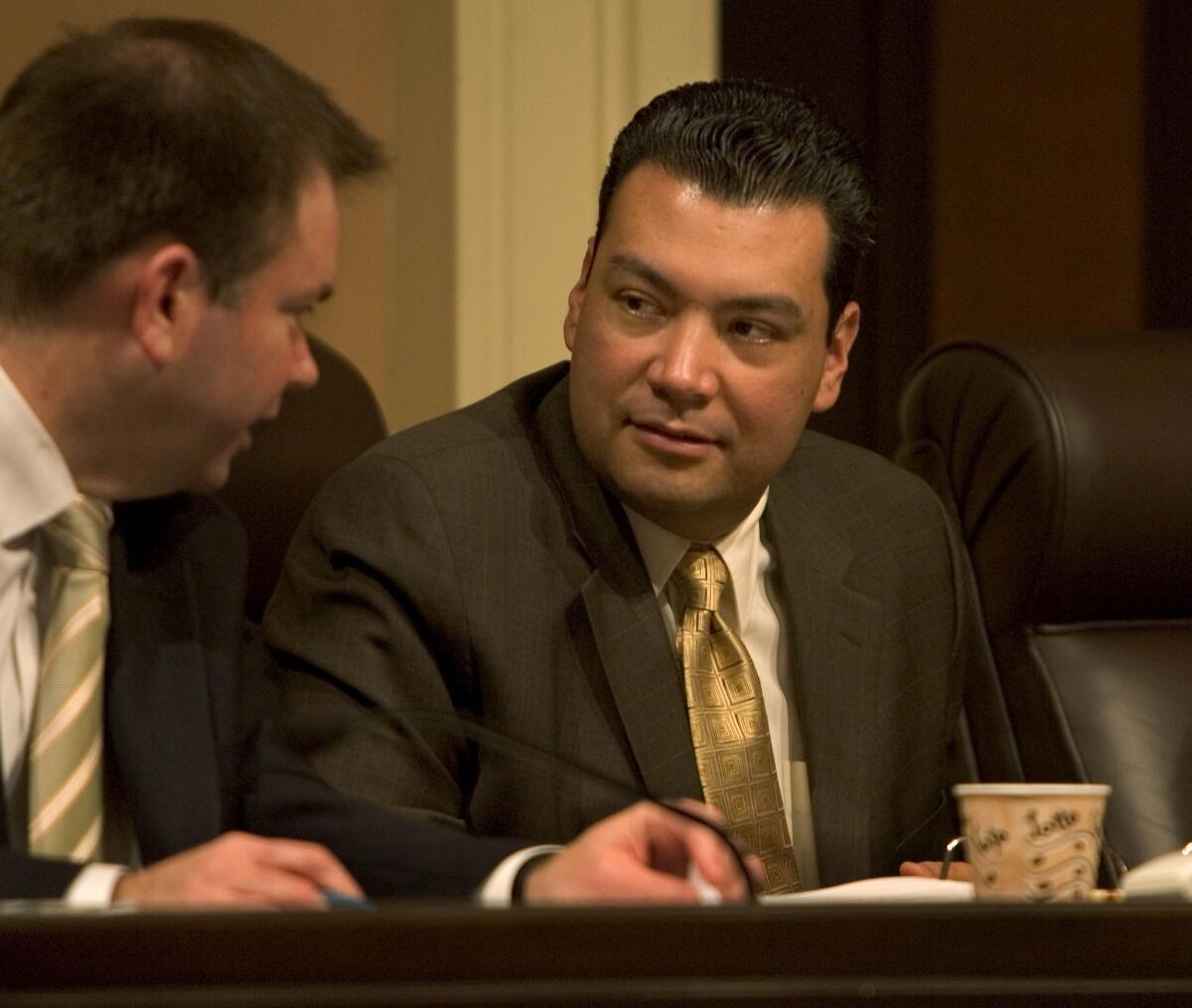
The state Senate approved a measure that would have eligible citizens registered to vote when they get their driver's license at the Department of Motor Vehicles unless they opt out.
“Voter registration still stands as a significant impediment to voter participation in our state,” said Sen. Ricardo Lara (D-Bell Gardens).
However, all Republicans who voted opposed the bill, with some saying they are concerned that it could lead to voter fraud. Sen. Jeff Stone of Murrieta said the bill would “further undermine the integrity of our election system.”
The measure has to go back to the Assembly for action on amendments and would not take effect until a new computerized voter registration database is established in about a year.
Time for a break
Another climate change bill stalls

Valero’s Wilmington refinery in 2010. Legislation by Sen. Fran Pavley (D-Agoura Hills) would put into law executive orders issued by Govs. Jerry Brown and Arnold Schwarzenegger to reduce greenhouse gas emissions.
It's been a rough week for climate change legislation. A measure from Sen. Fran Pavley (D-Agoura Hills) that would extend California's greenhouse gas reduction targets is being delayed until next year.
“Unfortunately, the state Assembly and the administration were not supportive, for now, and we could not pass this important proposal,” she said in a statement.
The measure, SB 32, would codify in state law long-term goals set through executive order by Gov. Jerry Brown and his predecessor, Gov. Arnold Schwarzenegger.
Pavley had tried to build support for the measure by increasing legislative oversight of state regulators, something the Brown administration has resisted.
The news came one day after an announcement that gasoline reduction targets were being stripped from another bill, SB 350.
Twinsies
Assembly rejects measure to limit police seizure of assets
Facing intense opposition from law enforcement groups, a measure to limit police seizures of cash, cars and other property from people not convicted of a crime fell flat in the Assembly.
Opponents blast asset-forfeiture bill in Assembly
A bill that would place restrictions on police seizures of assets suspected to be tied to crimes is facing road bumps in the Assembly this afternoon.
Assemblymen Donald P. Wagner (R-Irvine) and Jim Cooper (D-Elk Grove), who also is a former captain for the Sacramento County Sheriff's Department, rose to speak against the bill.
As of right now, SB 443 has fallen far short of the votes it needs and is stuck on the Assembly floor at 27 votes.
The matter is a telling show of force from the law enforcement lobby, which has vigorously opposed the bill.
Senate OKs oil pipeline technology bill
The Senate has approved a bill that would require the state fire marshal's office to make sure oil pipelines in scenic areas are using the latest technology to avoid spills, including automatic shutoff valves and leak detectors.
"This measure will help protect state waters," said Sen. Hannah-Beth Jackson (D-Santa Barbara).
The bill, AB 864 by Assemblyman Das Williams (D-Santa Barbara), now goes back to the Assembly for action on amendments.
Passed: Bill would expand ban on firearm possession for convicted criminals

The Senate on Thursday sent the governor a bill that would increase the list of crimes that result in a 10-year ban on possessing a firearm.
The bill by Sen. Hannah-Beth Jackson (D-Santa Barbara) would extend the ban to those convicted of receiving a stolen gun and carrying ammunition onto school grounds. SB 347 was changed in the Assembly to remove crimes such as selling ammo to a minor.
"This bill will help prevent gun violence by prohibiting the purchase of firearms by people shown to be a high risk for future criminal activity," Jackson told her colleagues. The vote was 23 to 14.
Sen. Jim Nielsen of Gerber was one of the Republicans to vote against the bill, saying the state should focus on people who commit violent crimes.
Passed: A push for more inspection of pipelines
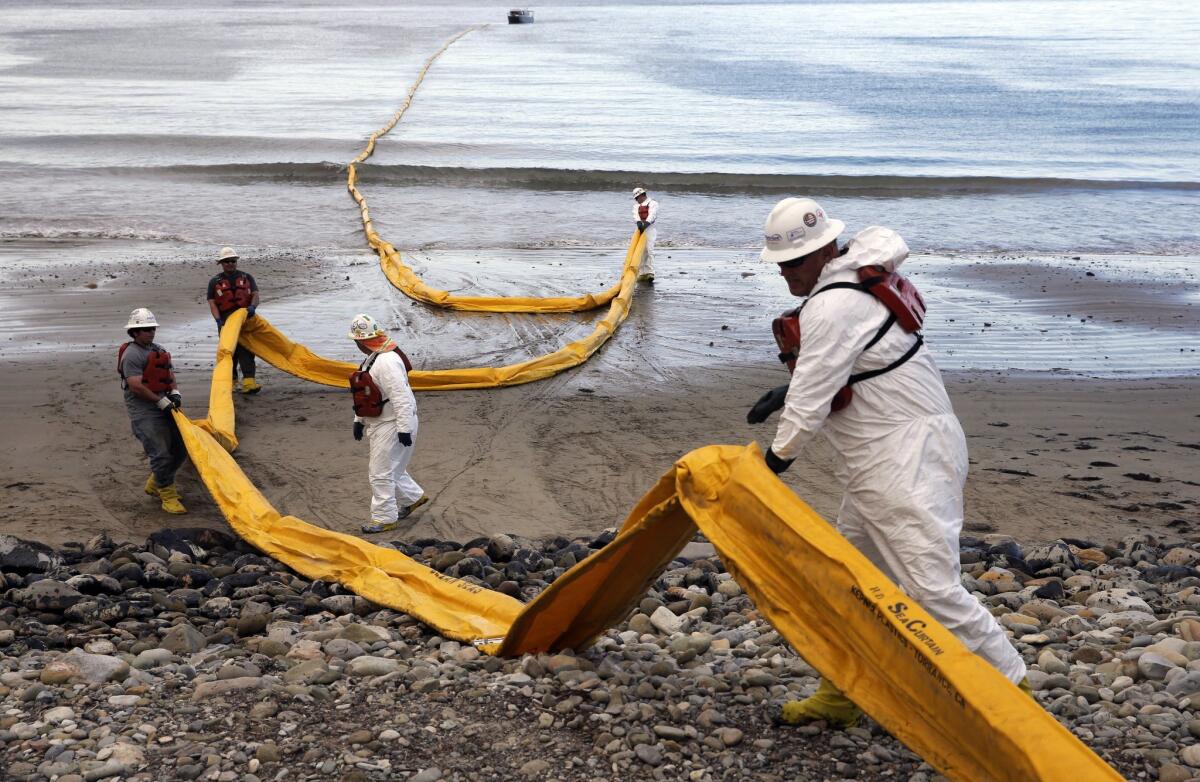
Workers prepare an oil containment boom at Refugio State Beach after last month’s oil spill north of Santa Barbara.
Alarmed by a pipeline rupture that dumped 20,000 gallons of oil into the ocean off the Santa Barbara County coast, the Senate has sent the governor a bill that would require the state fire marshal's office to annually inspect all intrastate pipelines under its jurisdiction.
Sen. Hannah-Beth Jackson (D-Santa Barbara) introduced the bill in response to the May 19 spill at Refugio State Beach from a pipeline that was being inspected every other year.
“If the pipeline had been inspected more frequently, the spill could have been avoided because we would have known it was corroding more rapidly,” Jackson said in support of her bill, SB 295.
A companion measure that would have banned oil drilling off the Santa Barbara coast recently failed to win support in the Assembly.
Passed: Effort to suspend high school exit exam

Students at Francisco Bravo Medical Magnet High School practice for new state standardized tests in February. The tests have supplanted older ones, including the high school exit exam.
The Senate has sent the governor a bill that would suspend California's high school exit exam for three years and allow diplomas to be issued to some 40,000 students who did not pass it.
SB 172, by Sen. Carol Liu (D-La Cañada Flintridge), suspends the exam through the 2017-18 school year and requires local educational agencies to grant a diploma to any student who completed 12th grade since 2004 and met all other graduation requirements.
The state canceled its contract with the test-giver because the exam is not up to date with the California Common Core Standards adopted in 2010. “The exit exam is no longer being offered,” Liu told her colleagues, adding that it would be unfair to punish students who cannot take the test.
Sen. Bob Huff (R-Diamond Bar) opposed suspending the requirement, saying of the test, “At least it's something that indicates that they [students] have met some educational requirements.”
Passed: Bill to track racial profiling by police
The Assembly has passed a proposal that would require police to track racial profiling statistics, a day after the Senate did the same.
The measure, AB 953 by Assemblywoman Shirley Weber (D-San Diego), was opposed by Republicans and law enforcement groups who said the requirements would be costly and onerous.
The bill heads to Gov. Jerry Brown's desk.
Brown has not indicated whether he would sign the bill.
Special delivery
Assemblyman Brian W. Jones (R-Santee) hands Assemblyman Tom Lackey (R-Palmdale) a bouquet.
Tobacco tax bills could bring first hike since 1998
A proposed $2-a-pack cigarette tax is one of the many issues yet to be decided with two days left in the legislative session.
There are currently two bills under consideration that would raise the per-pack cigarette tax by $2; one of them combines it with another tax on managed-care plans.
If one of the proposals ultimately becomes law, it would be the first tobacco tax increase in more than 15 years.
Past efforts to raise the tax in recent years have failed.
Regulations on tobacco fall under that category of issues that inspires plenty of power politics (and cash) in Sacramento. Altria, which owns Philip Morris, spent nearly $275,000 on lobbying this year alone.
Passed: Higher compensation for the wrongfully convicted
Passed: Vaccination requirement for child care workers
Lots of conversations
Stop cops from 'bounty hunting,' Mitchell urges
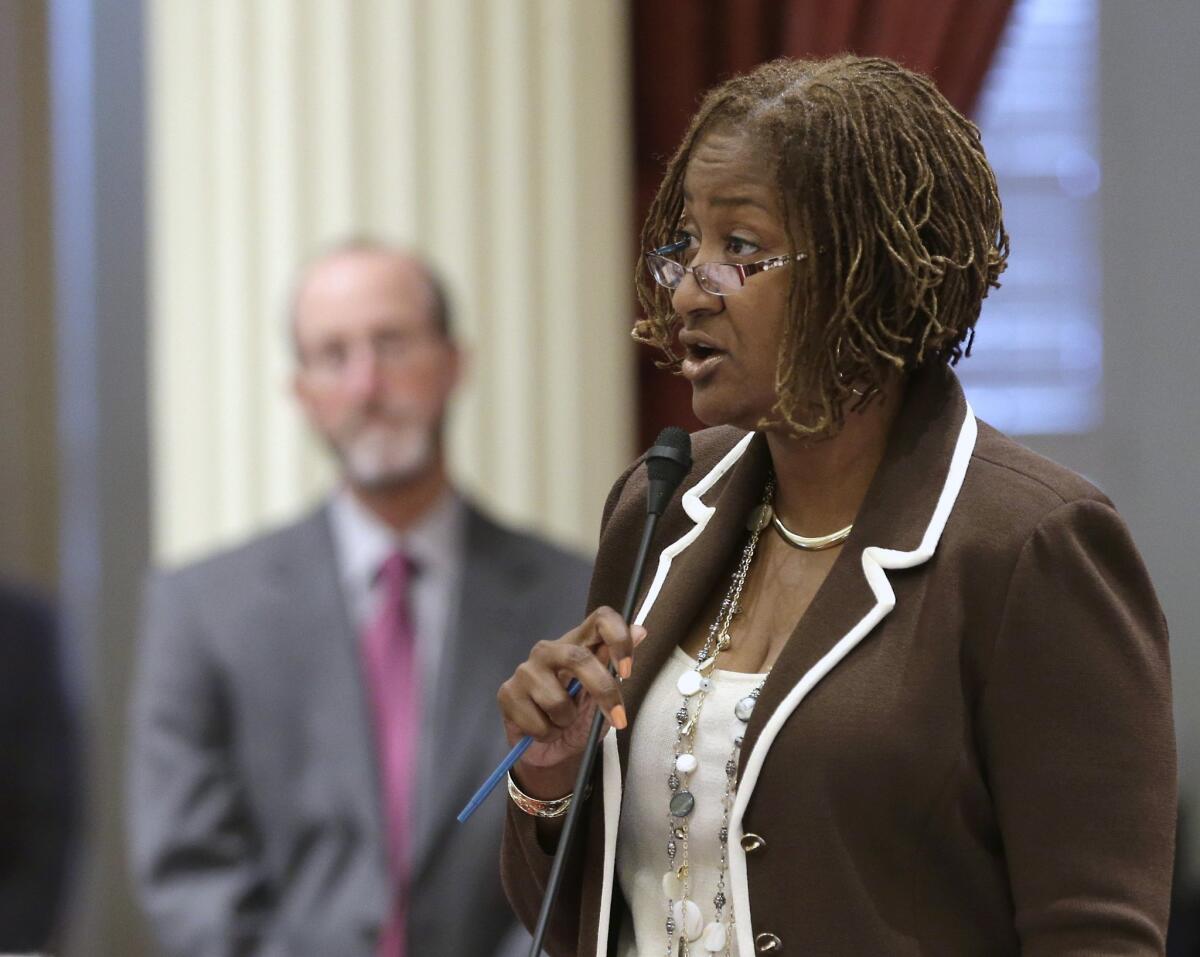
State Sen. Holly Mitchell (D-Los Angeles) speaks to the Senate in June. Mitchell has offered a bill that aims to rein in California authorities’ ability to seize the assets of suspected criminals.
Sen. Holly Mitchell (D-Los Angeles) made an impassioned pitch this morning for her bill to curb police seizures of cash, cars and other property from people who have not been convicted of a crime.
At a news conference, Mitchell told reporters that lobbyists for law enforcement are making "exaggerated claims of the return to the drug kingpin days of the '80s" in opposing the bill, SB 443.
She said reforms in California were adopted 15 years ago. "Those reforms are being sidestepped by California law enforcement in order to continue bounty hunting at the expense of California taxpayers," Mitchell said. "I find that offensive."
Assemblyman Reggie Jones-Sawyer (D-Los Angeles) said of the asset forfeiture practice, "It's a gross miscarriage of justice, and it must stop."
-- Patrick McGreevy and Melanie Mason
Bill to ban 'Redskins' as school mascot heads to governor
If the governor signs the measure, all public schools would be banned from using the term "Redskins" for school or athletic team names, mascots or nicknames.
The bill provides some flexibility to address cost issues, allowing schools to continue to use sports and band uniforms and other materials as long as they've picked a new name to use in the future and do not buy all new gear with the old name emblazoned on it.
Schools would be able to replace up to 20% of uniforms with the old name, but only until Jan. 1, 2019.
The bill would also prohibit schools from buying or distributing yearbooks, newspapers, programs or other materials bearing the name "Redskins."
There are four public schools in California that use the term for their teams. One is Gustine High School in Merced County, which uses it for the football team.
The town of Gustine, population 5,500, has opposed the legislation, saying the decision should be made locally.
Passed: More transparency on who pays for lawmakers' trips

A STUNNING AERIAL SHOT of Diamond Head State Monument on Oahu reveals the circular crater, thought to have originated as many as a half-million years ago in a series of explosive volcanic blasts. The diameter of the crater is about 3,500 feet. Arnie Cooper
The state Senate has approved a bill that would require some disclosure of who pays for lawmakers to attend conferences in Hawaii and other exotic locales.
The measure, SB 21 by Sen. Jerry Hill (D-San Mateo), originally proposed that nonprofits that host the conferences disclose the donors. The Assembly watered the legislation down to require disclosure only of donors in the preceding year who also accompanied the elected official on the trip.
Hill said the bill "increases transparency in the Political Reform Act."
The vote was 36-0, and the bill now goes to Gov. Jerry Brown for his consideration.
Health plan-tobacco tax combo clears committee
The double-barreled bill that would up taxes on tobacco as well as managed-care plans cleared its first hurdle Thursday.
Hernandez's bill now moves to the special session finance committee. Because it is part of the special session, the bill does not need to be passed by the Legislature by Friday's adjournment, but legislative leaders have signaled they would like a resolution by that day.
The thorniest issue is how to tax health plans. California currently imposes a tax on plans with Medi-Cal patients, but the federal government has said the state must change that to tax all managed-care organizations, or face a plunge in federal funding.
But though health insurers have been negotiating with Gov. Jerry Brown's administration and lawmakers to settle on a tax proposal, no consensus has emerged.
All proposals would need Republican support in the Legislature, and the GOP has not signaled a willingness to sign off on more taxes.
It's starting soon
The state Assembly floor session is about to begin for the morning.
But it doesn't look like everyone is quite ready to start yet.
Should cops be allowed to keep seized assets before you're convicted? Assembly takes a look
One of the bigger bills that promises some true-to-fashion late-session vote-wrangling Thursday is a bill that would restrict the ability of state and local law enforcement to keep money, cars and homes seized from suspects who haven't been charged.
Under federal law, law enforcement agencies can keep those seized assets if the agencies suspect they were used to commit a crime or are the proceeds of illegal activity. The owner doesn't even need to be convicted or charged with a crime.
State law in California is typically stricter, requiring that the person be convicted. But there are exceptions when California authorities partner with federal officials through joint investigations or task forces, allowing local and state police to keep up to 80% of the proceeds.
Under SB 443, state and local law enforcement could do so only if the person is convicted.
The bill is being shepherded by an unlikely pair of lawmakers: Sen. Holly J. Mitchell of Los Angeles, one of the chamber's most liberate Democrats, and Assemblyman David Hadley, a Republican freshman from Manhattan Beach.
If the measure passes the Assembly floor, it still must clear the Senate before heading to the governor's desk.
Gearing up
Getting ready to rumble
Assemblyman Mike Gatto (D-Glendale) posted this photo of a Capitol hallway where sergeants-at-arms appear to be preparing for a particularly busy day.
Bill that would tax tobacco, health plans tax gets its day in committee
Before floor debate gets underway today, a Senate committee for the legislature's special session on healthcare will hold a hearing on a new bill that would tax health plans and increase taxes on tobacco.
Sen. Ed Hernandez (D-West Covina) says his legislation is the "only comprehensive piece of legislation that directly addresses the shortage of funding for California's most vulnerable communities."
The bill, introduced Wednesday, would up the tobacco tax by $2 a pack and includes an comparable increase for e-cigarette products.
A separate $2-per-pack tax hike on cigarettes was proposed a couple weeks ago, as was another bill that would tax managed care organizations to help fund Medi-Cal and other social services.
The proposal requires a 2/3 vote in both houses to pass.
Moving on from Jerry Brown's no-good, very bad day
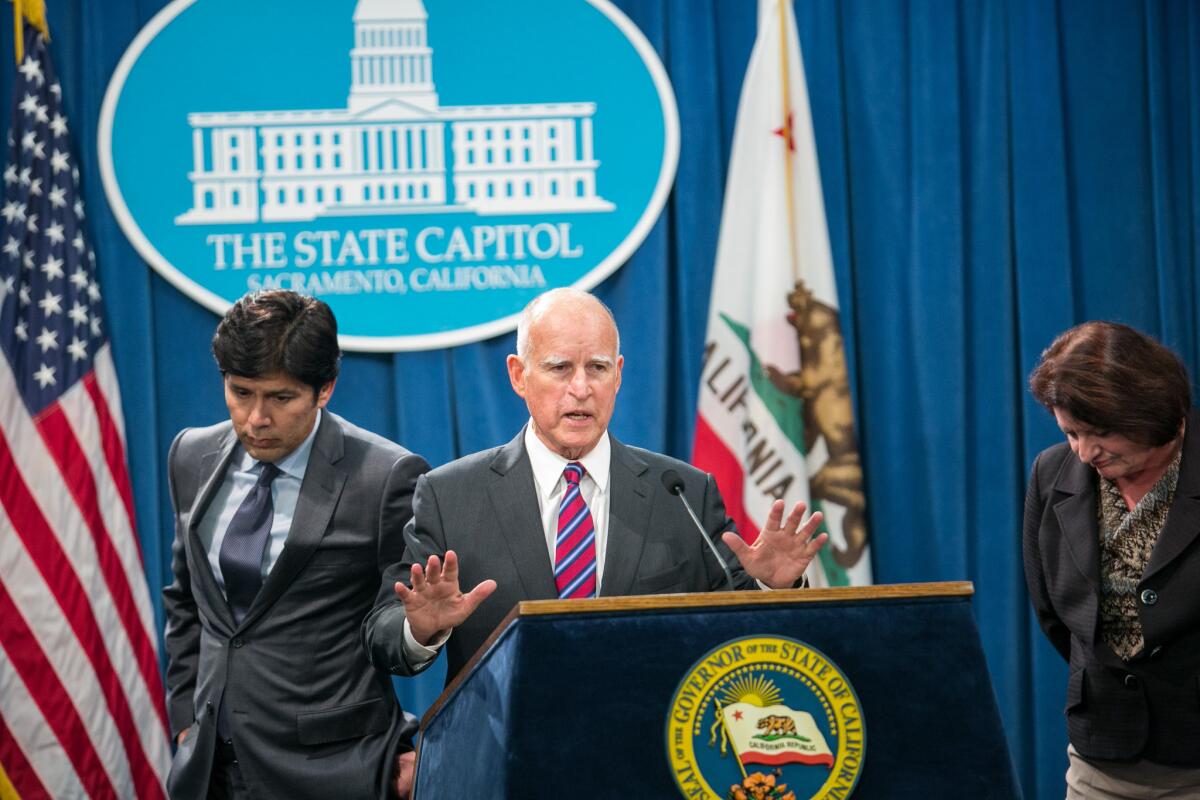
Gov. Jerry Brown Jr., center, talks about gas reduction being dropped from the climate change bill at a Capitol press confrence.
After a rough day that saw climate change legislation stripped of gasoline reduction targets, Gov. Jerry Brown and Senate leader Kevin de León (D-Los Angeles) have to pick up the pieces.
In the Legislature, that means finalizing modifications to the measure, SB 350, so it only boosts renewable energy generation and energy efficiency. Three more steps are needed before it becomes law -- it must be approved by the Assembly, go back to the Senate to confirm the changes, then sent to the governor for his signature.
Also hanging in the balance is SB 32, a separate measure from Sen. Fran Pavley (D-Agoura Hills) that would codify in state law long-term targets for reductions in greenhouse gas emissions.
The bill stalled in the Assembly earlier this week, and it remains to be seen whether it can squeak through the Legislature. Lawmakers are required to finish their work by Friday night.
'The beginning of many more brouhahas'
Even though gasoline reduction targets have been removed from controversial climate change legislation, Gov. Jerry Brown is looking on the bright side.
“This has helped the cause of clean energy,” he said at the Capitol today.
Why's that? Brown is looking to a decades-old civil rights battle for inspiration.
When California conservatives pushed a 1978 ballot measure known as the Briggs Initiative to prevent gay people from working in public schools, it backfired and public support began to swing in the other direction.
“That opened up the legitimacy of that debate,” Brown said, and helped get the ball rolling for gay rights.
He hopes the oil industry's fierce opposition to climate legislation causes its own shift in political debate.
“We got a big brouhaha, and it's the beginning of many more brouhahas,” Brown said.
Vetoed: Restriction on flying drones
Gov. Jerry Brown has vetoed legislation that would have restricted the use of aerial drones over private property.
SB 142 would have made flying a drone less than 350 feet above private property without consent a trespass violation.
-- Phil Willon and Patrick McGreevy
Signed: Help for prosecutors in 'revenge porn' cases
Gov. Jerry Brown has signed a measure aimed at helping prosecutors in "revenge porn" cases -- events in which an estranged spouse or romantic partner posts nude or sexual pictures of a partner to embarrass that person.
The measure, requested by the state attorney general, allows prosecutors to seek forfeiture of the images used in the crime and the data storage device used for the photos. It is SB 676 by Sen. Anthony Cannella (R-Ceres).
-- Phil Willon and Patrick McGreevy
Moderate Democrats' leader is happy
Assemblyman Henry T. Perea (D-Fresno), who leads the moderate Democrats in the chamber, called dropping the climate change bill's oil portion good news.
"I anticipate that there will be a lot of support for SB 350," he said, adding that with the bill's remaining parts, California would still be "the leading entity on climate change."
Perea downplayed the influence of oil companies, saying that "both sides were very aggressive" in campaigning for their desired outcomes.
The spokesman for Senate leader Kevin de León (D-Los Angeles) offered a different perspective: “Assemblymember Perea was pushing WSPA [oil industry] amendments at every negotiation."
A victory for oil companies
The provision calling for a 50% cut in petroleum use by 2030 will be dropped from climate change legislation that includes Gov. Jerry Brown's environmental goals, removing what was the main political obstacle to pass the bill before the Legislature's session ends Friday.
Confirmed: Oil dropped from climate change bill
The climate change legislation has lost the part that dealt with oil, but Gov. Jerry Brown emphasized in his announcement that regulators will still have the power needed to push green policies.
Passed: Privacy protections on smart TVs
The Assembly has passed a measure to protect Californians from television voice-recognition features that can secretly record private conversations. It now goes to Gov. Jerry Brown for approval.
The measure would require television makers to notify people who buy smart TVs that their voices may be recorded and transmitted back to the manufacturers or to third-party providers, according to Assemblyman Mike Gatto (D-Glendale), the author of AB 1116.
It also would prohibit anyone from using or selling the recordings collected to refine the voice-recognition feature of a television, Gatto said.
“Smart TVs and voice-recognition technologies are innovative and convenient tools, but giving up our right to privacy in the home because we want to utilize voice-command features to change the channel is simply unacceptable,” Gatto said after the Assembly approved the bill. The Senate had already passed it.
Oil part dropped from climate change bill?
Expect more details at the upcoming news conference.
Passed: A redo for election recounts
AB 44, which would create a new statewide recount process, has passed both houses and now heads to Gov. Jerry Brown's desk for a signature.
The measure passed the Assembly floor Wednesday in a 67-4 vote.
Most significantly, the bill would require the state to pay for recounts in especially close statewide races -- those with a difference of 1,000 votes or fewer, or 0.00015% of all ballots cast, whichever is smaller.
The governor would be required to order the recount under the bill.
Currently in California, any candidate or registered voter can call for a recount, but he or she has to pay for it.
The recount process was criticized last year after initial returns for the controller's race showed a difference of fewer than 500 votes . Alex Padilla, who went on to become California's secretary of state, called the recount process "embarrassing."
After speed bumps, a slimmed-down road repair proposal
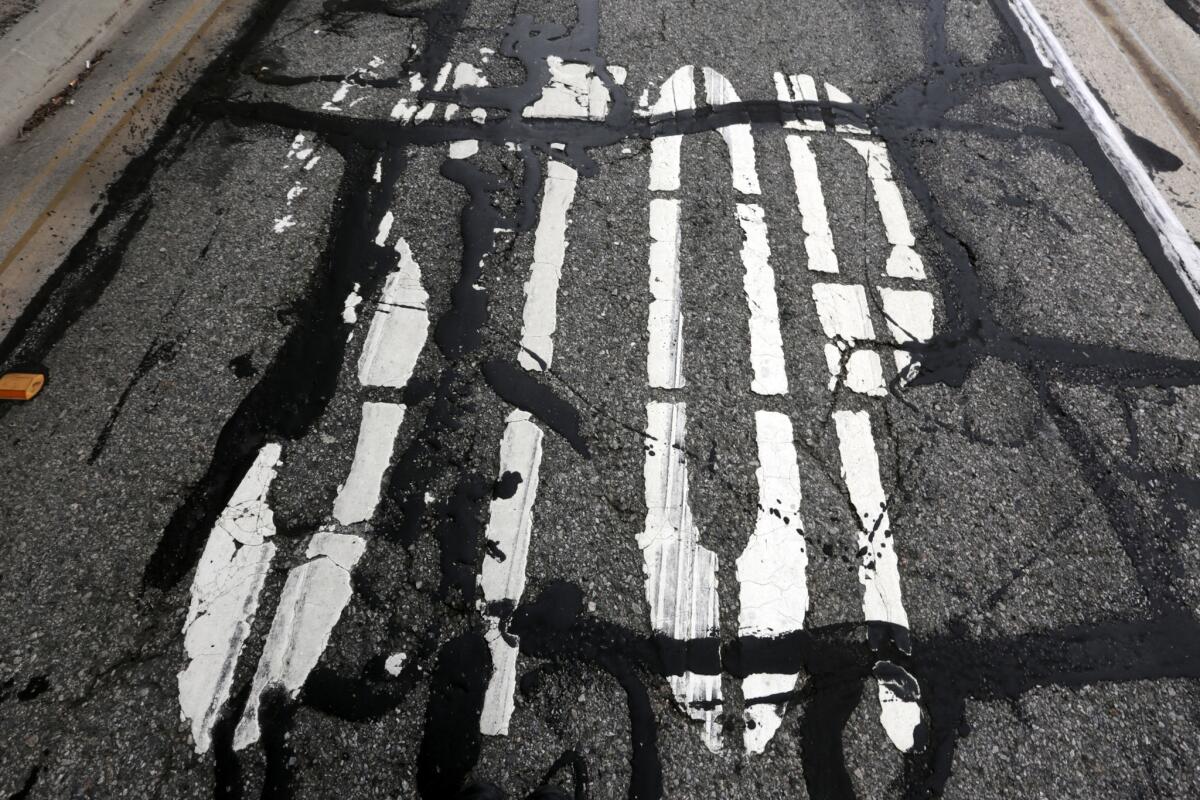
The entire Main Street offramp from the Southbound I-5 freeway in Los Angeles is a network of cracks that have been patched with a black, rubbery sealer. California is facing a $59-billion bill for overdue road repairs and there is no plan in place to cover the costs.
After failing to reach a deal on a plan to find billions of dollars for road repairs, Gov. Jerry Brown's administration floated a less ambitious proposal Wednesday, according to people familiar with the talks.
The slimmed-down $1-billion proposal would need only a majority vote, which Democrats can muster without Republican help, according to sources.
Last week, the governor put forth a $3.6-billion proposal to address road repairs, but Republicans refused to support the higher taxes and fees that would fund the plan.
Because Brown called a special legislative session to address the issue, a deal does not need to be reached by Friday night, when lawmakers are required to finish their regular work for the year.
Governor finally exits de León's office
Gov. Jerry Brown has left that meeting that included Senate leader Kevin de León (D-Los Angeles) and Assembly Speaker Toni Atkins (D-San Diego) and lasted more than two hours.
On his way out, Brown did not answer reporters' questions on negotiations over climate change legislation.
Senate OKs effort to track racial profiling by police
The state Senate has approved a measure that seeks to shine a light on racial profiling by law enforcement.
The measure, AB 953 by Assemblywoman Shirley Weber (D-San Diego), would require police officers to collect data on police stops and on the perceived race and ethnicity of the person being detained. It passed 26-13 and now heads back to the Assembly for final approval.
“The time has come to have a clear conversation with law enforcement about what we as a society will no longer accept — and that's racial profiling by those who indeed take an oath to protect and serve all of us fairly and equally,” said Sen. Holly Mitchell (D-Los Angeles), who carried the bill in the Senate.
Republicans who spoke against the measure said it would be costly to implement. “An officer [will be] spending an abundant amount of time doing paperwork rather than being on the streets,” said Sen. Jeff Stone (R-Murrietta).
And an array of law enforcement groups has opposed such reporting requirements, calling them onerous.
Assembly speaker gets in on closed-door talks
Assembly Speaker Toni Atkins (D-San Diego) has joined that meeting with Senate leader Kevin de León (D-Los Angeles) and the governor, but what are they discussing? She wouldn't say.
Aid-in-dying bill moves forward to Senate
California's aid-in-dying bill has just passed the Assembly floor, after more than two hours of emotional debate and some maneuvering by Republicans who sought to block the vote.
In closing remarks, the bill's sponsor, Assemblywoman Susan Talamantes Eggman (D-Stockton), described how she had cared for several dying family members over the last several years and has extensively studied and taught end-of-life care.
"I don't come at this lightly," she said, her voice cracking at times as she described the deaths of her mother, father and sister-in-law.
The bill now heads to the Senate, which is expected to pass the measure. It still could be vetoed by Gov. Jerry Brown.
Here's how California's Assembly members voted:
Reject climate change bills, business groups say
Some of California's biggest business organizations gathered Wednesday to urge lawmakers to reject proposed climate change rules.
They said new environmental regulations would result in higher costs and job losses.
“We could have increases in green jobs. But it's not going to make up for the loss of middle-class manufacturing jobs,” said Dorothy Rothrock, president of the California Manufacturers and Technology Assn.
The state Chamber of Commerce and the Building Industry Assn. were also among the groups opposing the legislation.
Claire Conlon, a spokeswoman for Senate leader Kevin de León (D-Los Angeles), said those groups “represent the old energy economy” and cited support from other businesses.
“We recognize the current way of doing business is not sustainable, and we have to continue building an economy that will thrive in the future,” she said.
Spotted in the Capitol: Leaders involved in climate change negotiations
Gov. Jerry Brown is on the move in the Capitol, heading to the office of Senate leader Kevin de León (D-Los Angeles) with one of his top aides, Nancy McFadden.
They've been trying to seal the deal on controversial climate change legislation that would boost renewable energy, increase energy efficiency and slash gasoline use.
The trick is to reach a compromise on modifications to the measure , SB 350, that would keep supporters happy while also winning over skeptical Democrats in the Assembly.
Emotional appeals as Assembly takes up aid-in-dying bill
California's aid-in-dying bill is now being debated on the Assembly floor. The bill would allow doctors to hasten the death of terminally ill patients by prescribing lethal doses of drugs.
Lawmakers have been deeply divided on the issue and made impassioned calls Wednesday to fellow lawmakers on both sides.
Assemblywoman Lorena Gonzalez, a Democrat, said she opposes the bill and expressed concern that the poor might disproportionately be pressured into considering physician-assisted suicide because they don't have sufficient access to healthcare due to cost or language barriers.
Other lawmakers made moral appeals.
If the bill passes the Assembly, it still would have to go through the Senate committee process and a floor vote in that house before it's sent to Gov. Jerry Brown.
Fight is on over California climate change bills
As the governor and legislative leaders scramble to craft a compromise on SB 350, the climate change bill, business groups are poised to oppose the measure.
In a news conference Wednesday morning, industry groups, including the California Chamber of Commerce, are expected to oppose SB 350 along with SB 32, a separate bill aimed at codifying long-term targets for cutting greenhouse gas emissions laid out in executive orders by Govs. Jerry Brown and Arnold Schwarzenegger.
Legislative leaders spent Tuesday in private meetings hashing out final details on the measure, which is aimed at cutting gasoline use on state roads, increasing energy efficiency and boosting renewable energy in the state.
Possible modifications, reviewed by The Times and described by Capitol sources, would impose new limits on environmental regulators and alter the approach to cutting the volume of gas burned by California drivers.
Happy birthday, California; now get to work
With a busy few days ahead for the legislature, Gov. Jerry Brown took a moment to acknowledge the 165th anniversary of California's statehood.
California became the 31st American state on Sept. 9, 1850.
But don't expect a whole lot of celebrating. The occasion is no longer marked by a state holiday.
Plus, with three days left for lawmakers to finish their work this year, there may not be much time.
Three days and counting
The California Legislature has just three days left to decide the fate of bills that could shape the state's climate change policies, the health of California roadways and bridges and new restrictions on cigarettes.
The state Assembly also is expected to vote on a proposal to let doctors help terminally ill patients end their own lives by prescribing lethal doses of drugs, and discussions will continue on a measure to raise the smoking age to 21 in California and impose state regulations on medical marijuana.
Meantime, Gov. Jerry Brown and Democratic leaders in the Legislature continue to negotiate over controversial climate change measures that would slash gasoline use on state roads, increase energy efficiency and boost renewable energy in California.
Both the state Senate and Assembly convene at 10 a.m. Just what legislation will pass, or what deals will be cut, remains in flux. The Assembly and Senate sessions will be televised and webcast live on the California Channel.
Stay with us for live updates of Capitol happenings throughout the day.
Bill limiting police searches of email goes to Senate
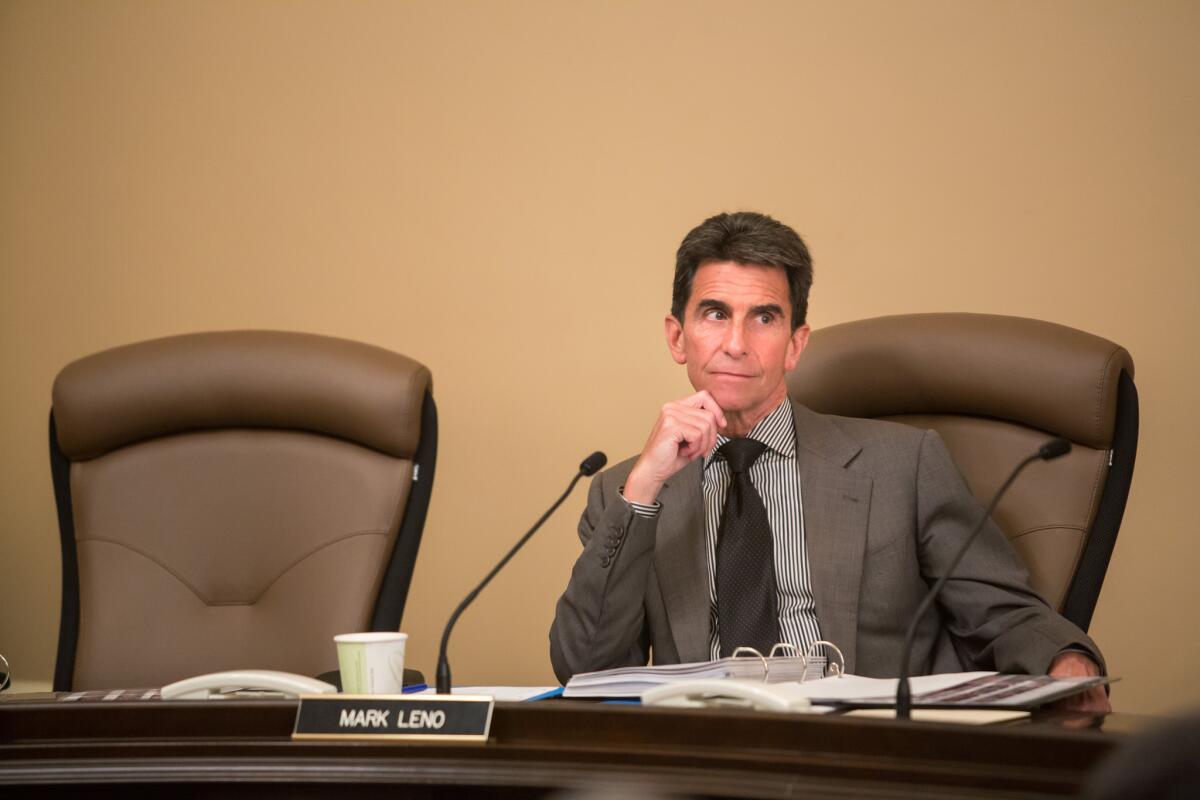
Sen. Mark Leno (D-San Francisco) at the state Capitol. Leno’s bill would require law enforcement agencies in most circumstances to obtain a warrant for digital communications, such as e-mails.
Lawmakers in the Assembly narrowly approved a bill that would put in place stricter privacy limits on police access to emails and other electronic communications.
The measure by Sen. Mark Leno (D-San Francisco) would require law enforcement agencies in most circumstances to obtain a warrant for digital communications such as emails.
Supporters noted the bill explicitly exempts child pornography investigations from certain provisions, such as the requirement that electronic communications be destroyed after 90 days.
Assembly members approved the measure, SB 178, on a 55-11 vote. The bill required a two-thirds vote because it would amend the state Constitution. It now heads to the Senate.
Passed: Ban on plastic microbeads

Environmental activist and scientist Marcus Eriksen was able to collect dozens of plastic particles using a fine mesh net at the confluence of the Los Angeles River and the Arroyo Seco just north of downtown L.A. in 2014. The California Legislature on Tuesday voted to ban the use of plastic microbeads.
California lawmakers have approved a measure banning the sale of personal care products that contain plastic microbeads starting in 2020.
The microbeads, used in shampoos, soaps, toothpaste and exfoliating beauty products, have become a major source of pollution in the nation's waterways. They've been found in debris piles in the Los Angeles River, Pacific Ocean and the Great Lakes, said Rep. Richard Bloom, (D-Santa Monica), author of the bill, AB 888.
The bill passed the Assembly on Tuesday and was approved in the Senate in early September. It now heads to Gov. Jerry Brown for his consideration.
Haggling surrounds climate change bills
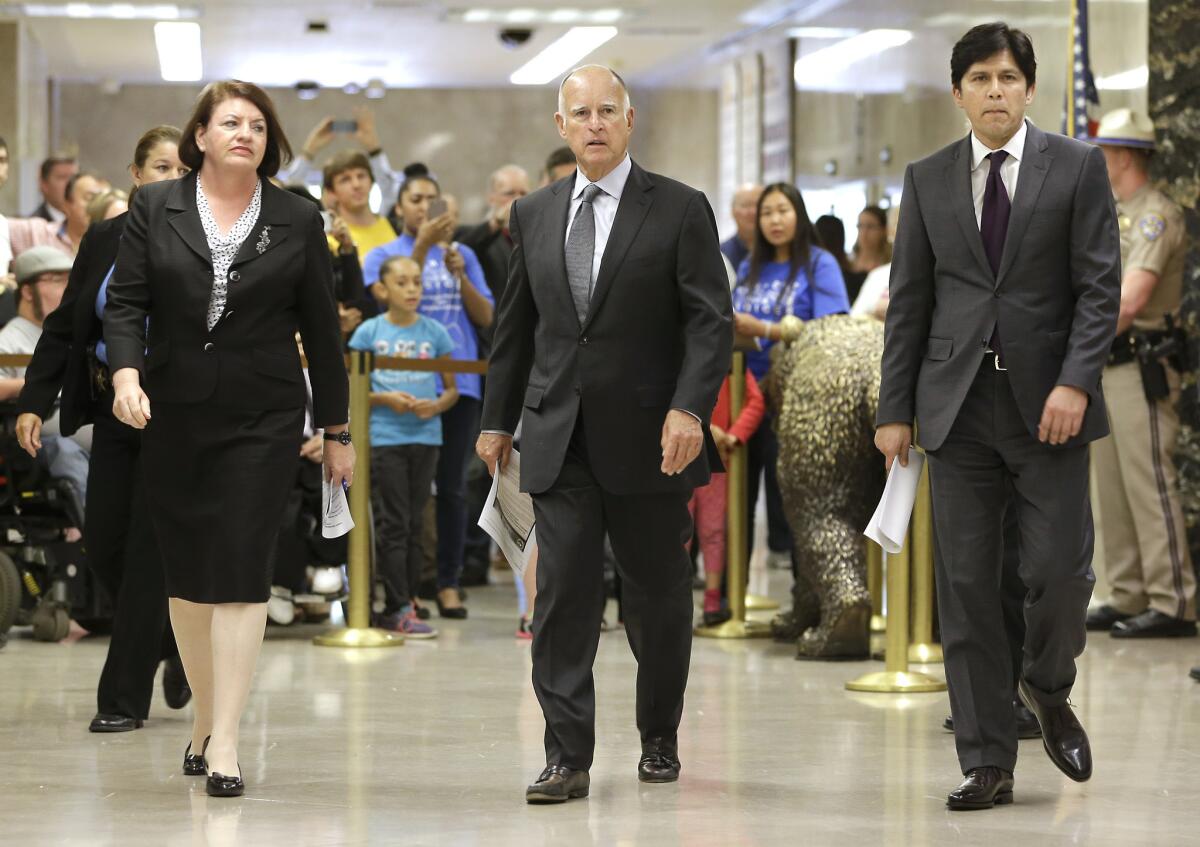
Assembly Speaker Toni Atkins (D-San Diego), Gov. Jerry Brown and Senate leader Kevin de León (D-Los Angeles) have been working to reach an agreemment on sweeping legislation intended to fight climate change.
Gov. Jerry Brown and legislative leaders have outlined potential changes to controversial climate change legislation, such as modifying the power of state regulators and shifting the focus of proposed targets for reducing gasoline consumption.
The changes, which still need to be formally introduced, were reviewed by The Times and described by Capitol sources. It remains to be seen whether they will satisfy skeptical Assembly Democrats, whose support is needed to approve the measure.
The most controversial part of the legislation, SB 350 by Senate leader Kevin de León (D-Los Angeles), has always been the goal of slashing in half petroleum use on state roads by 2030.
-- Chris Megerian and Melanie Mason
Bill on greenhouse gas emissions hits a wall
The climate-change bill introduced by state Sen. Fran Pavley (D-Agoura Hills) and backed by lawmakers from minority districts failed to pass in the Assembly this afternoon.
Lawmakers rejected SB 32 -- which would extend and tighten California's targets for reducing greenhouse gas emissions -- by a vote of 25-33.
However, it still could come up for reconsideration and be brought back to life.
Sign up for Essential California
The most important California stories and recommendations in your inbox every morning.
You may occasionally receive promotional content from the Los Angeles Times.
